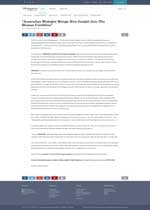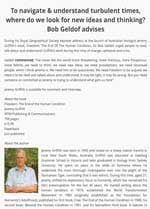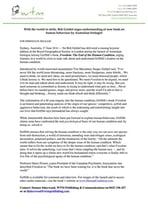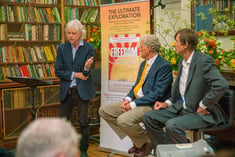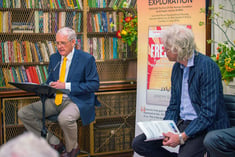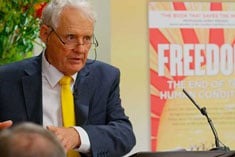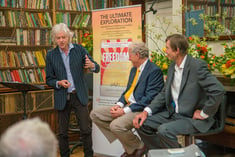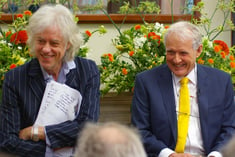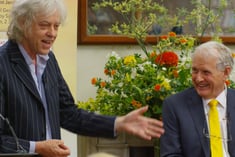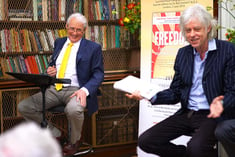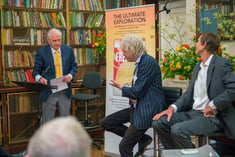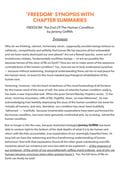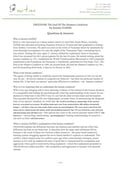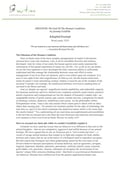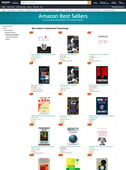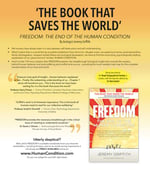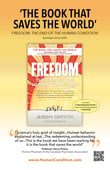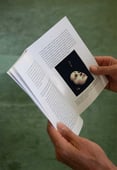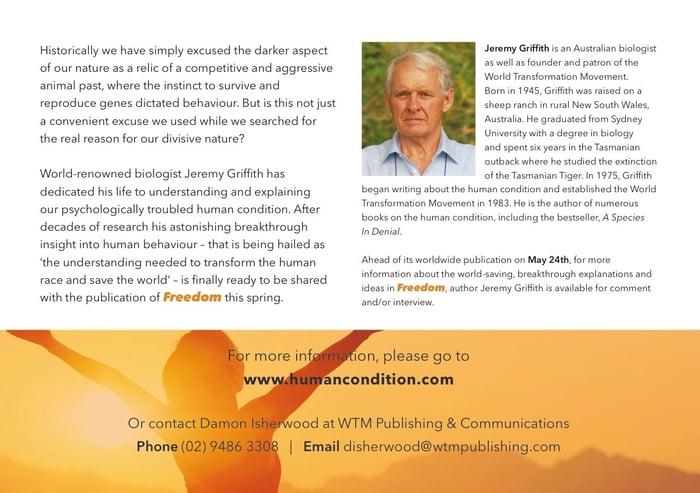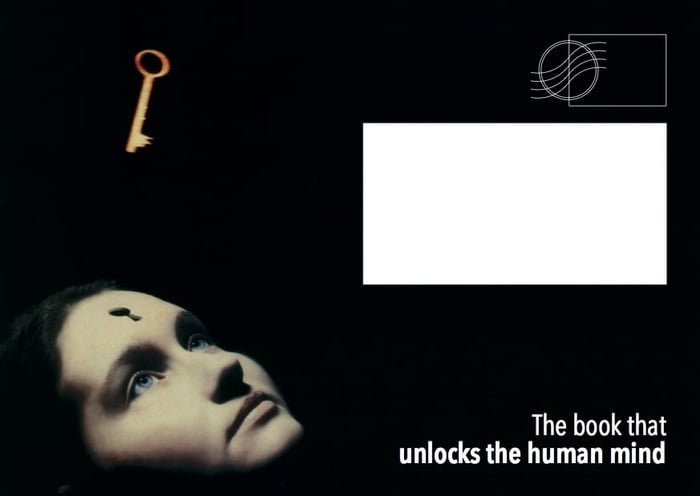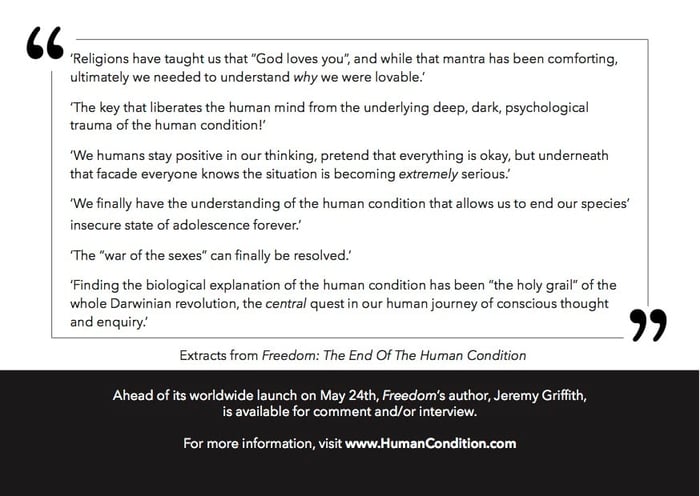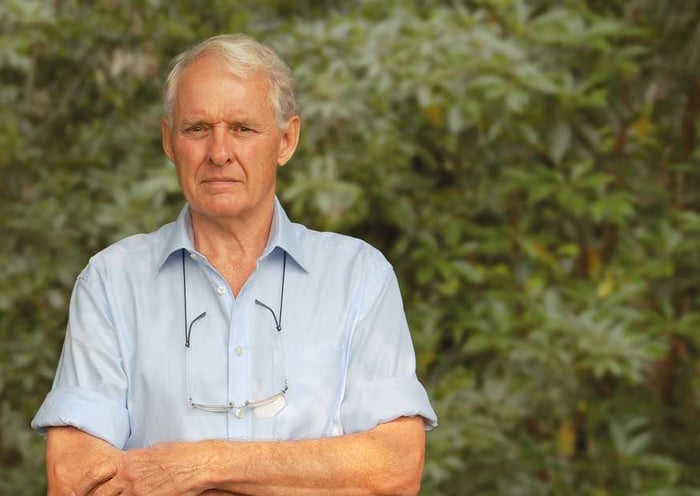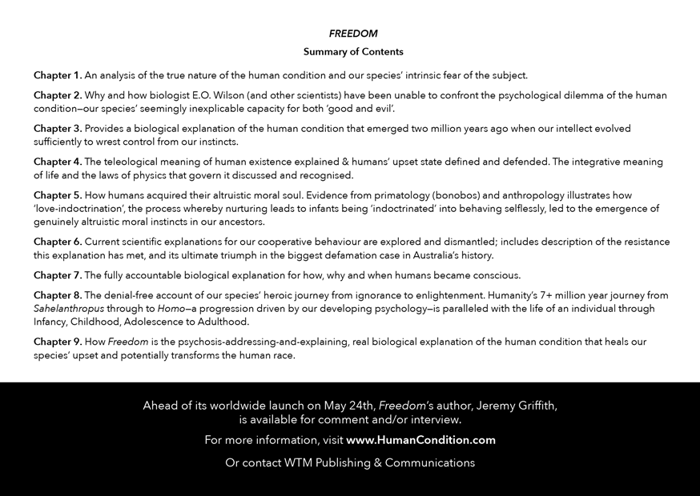MEDIA FACILITY
- Contents: (Click to scroll to each)
- Media Contact
- Reviews, Interviews & Articles
- Promotional Aids
- FREEDOM Promotional Materials
Media Contact
For media enquiries, review copies, comment and interviews, please contact WTM Publishing & Communications via THIS FORM
Note that FREEDOM: The End Of The Human Condition by Jeremy Griffith was released in May 2016, its summary booklet, Transform Your Life And Save The World, in October 2016, and its very short summary booklet in THE Interview That Solves The Human Condition And Saves The World! in 2020.
WTM Publishing & Communications Contact Form
Thank you for your enquiry.
Damon Isherwood from WTM Publishing & Communications will be in contact with you shortly.
Reviews, Interviews & Articles
Jeremy Griffith’s biological explanation of the human condition has been the subject of many reviews, interviews and articles. The following are a selection of the most interesting and informative:

2025: The REAL solution
to humanity’s problems

2025: Most powerful
and concise article

2024: ‘Great actor’ ‘in awe’ of ‘brilliant’ insight
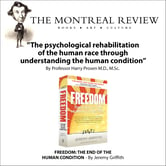
Feature Reviews
of FREEDOM
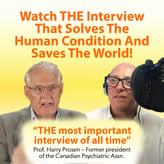
THE Interview
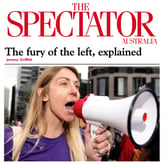
Article by Jeremy
exposing the Left
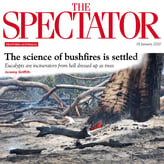
Article by Jeremy on
the science of bushfires

Jeremy interviewed on
Australian national TV
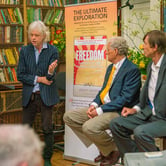
Launch of FREEDOM
at the RGS in London

Feature articles
about FREEDOM
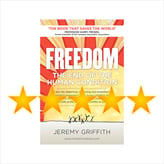
Reviews of FREEDOM
in bookstores
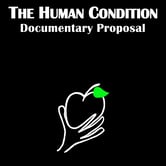
Endorsements from
Stephen Hawking et al

Interviews at launch
of A Species In Denial
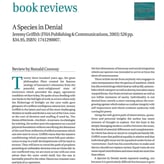
Reviews of Jeremy’s
earlier books
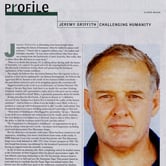
Magazine profile of
Jeremy Griffith
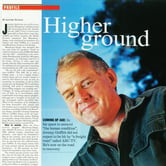
Court case vindication

Amazing 1988
radio interview
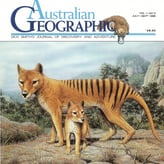
Jeremy’s thylacine
search

Jeremy’s furniture
business
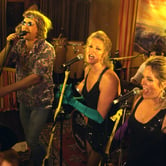
Tribute songs

WTM’s flag on
top of Everest
Promotional Aids
-

Promotional
Videos -

Online Video
Advertisements -
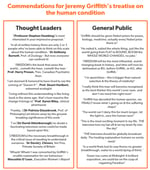
One page Commendations print out
-
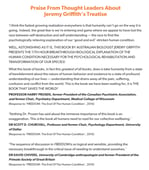
Further Praise From
Thought Leaders -
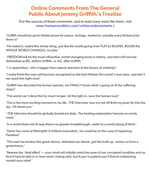
Further Praise From
General Public -
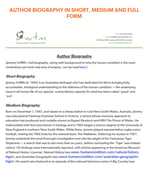
Jeremy Griffith’s
Biography -
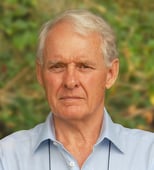
High Res. Author Image 1
(click to enlarge)
-
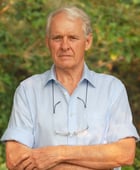
High Res. Author Image 2
(click to enlarge)
-
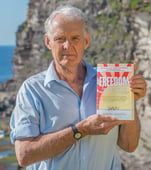
High Res. Author Image 3
(click to enlarge)
Praise From Thought Leaders About Jeremy Griffith’s Treatise
- ‘Professor Hawking [responding through his secretary because he suffered from motor neurone disease] is most interested in your impressive proposal.’
- PROFESSOR STEPHEN HAWKING, world-leading physicist, University of Cambridge
- (Response to ‘The Human Condition Documentary Proposal’)
- ‘I think the fastest growing realization everywhere is that humanity can’t go on the way it is going. Indeed, the great fear is we’re entering end game where we appear to have lost the race between self-destruction and self-understanding — the race to find the psychologically relieving explanation of our ‘good and evil’-stricken human condition.
- WELL, ASTONISHING AS IT IS, THIS BOOK BY AUSTRALIAN BIOLOGIST JEREMY GRIFFITH PRESENTS THE 11TH HOUR BREAKTHROUGH BIOLOGICAL EXPLANATION OF THE HUMAN CONDITION NECESSARY FOR THE PSYCHOLOGICAL REHABILITATION AND TRANSFORMATION OF OUR SPECIES!
- What this book of books, in fact this greatest of all books, does is take humanity from a state of bewilderment about the nature of human behavior and existence to a state of profound understanding of our lives — understanding that drains away all the pain, suffering, confusion and conflict from the world. This is the book we have been waiting for, it is THE BOOK THAT SAVES THE WORLD!’ and ‘FREEDOM is the book that saves the world…cometh the hour, cometh the man.’
- PROFESSOR HARRY PROSEN, former President of the Canadian Psychiatric Association, and former Chair, Psychiatry Department, Medical College of Wisconsin
- (Response to ‘FREEDOM: The End Of The Human Condition’; and an extract from his Introduction to ‘FREEDOM’)
- ‘Nothing Dr. Prosen has said about the immense importance of this book is an exaggeration. This is the book all humans need to read for our collective wellbeing.’ and ‘I have recommended his more recent work to my students precisely for his razor-sharp clarifications of positions of contemporary authors like Edward O. Wilson, Richard Dawkins, and Robert Wright. Griffith manages to summarize book-length expositions of these oftentimes obtuse and varying perspectives on human evolution with clarity and brilliance.’
- PROFESSOR SCOTT D. CHURCHILL, former Chair, Psychology Department, University of Dallas
- (Response to ‘FREEDOM: The End Of The Human Condition’; and an extract from an Expert Report, 2007)
- ‘The sequence of discussion in FREEDOM is so logical and sensible, providing the necessary breakthrough in the critical issue of needing to understand ourselves.’
- PROFESSOR DAVID CHIVERS, University of Cambridge anthropologist and former President of the Primate Society of Great Britain
- (Response to ‘FREEDOM: The End Of The Human Condition’)
- ‘This book is actually written from a position outside of the human condition. It is just amazing; Griffith walks freely through all the psychosis of our troubled human condition and with such freedom is able to explain everything about us!’ and ‘The WTM is an island of sanity in a sea of madness.’
- TIM MACARTNEY-SNAPE, biologist, mountaineer and twice-honoured Order of Australia recipient
- (Response to ‘FREEDOM: The End Of The Human Condition’)
- ‘I am stunned & honored to have lived to see the coming of “Darwin II”. I say this because after Darwin’s theory of Natural Selection explained the variety of life, Jeremy Griffith has gone on to solve the other four main questions science had to answer about our world and place in it. They are: 1) the dilemma of the human condition, which his instinct vs intellect explanation in chapter 3 of his main, seminal book FREEDOM finally solves; 2) how we humans became fully conscious when other species haven’t, which he answers in chapter 7; 3) the origins of humans’ unique moral nature, which he answers in chapter 5, which it turns out American philosopher John Fiske had already explained in 1874 but mechanistic science had ignored; and 4) the truth of the Integrative Meaning of existence (which we have personified as ‘God’), in chapter 4, which only a rare few thinkers in history have been able to recognize. And having been able to solve those primary issues he has, in chapter 8, using first principle and fully accountable biological explanations been able to resolve all the secondary problems like: the polarized state of politics; the rift between men and women; the schism between science and religion; the conflict between individuals and between races (thus ending aggression and war at its source); and, above all, bring an end to the threat of terminal psychosis and our species’ extinction! A truly phenomenal, beyond description, scientific achievement!’
- PROFESSOR STUART HURLBERT, Professor Emeritus of Biology at San Diego State University
- (Response to ‘FREEDOM: The End Of The Human Condition’)
- ‘If, after the explanation [by Jeremy Griffith], people at home think, I’ve never heard of it, it’s fantastic, what a beautiful new insight into the human status quo, condition, then of course you can look it up yourself and find it, and go further into it. That’s very much the intention…Because it also helped to open my eyes. Because I think when professors start talking about a lot of these completely complex matters, which they mostly do it among colleagues, we understand very little of it. You think, ‘When will you come up with a brilliant formula, so that we can all understand it?’…About the complexity of being human; and in particular, the brain…The brain somehow must have had a function too. And the problem was that the instinct and the conscious mind split apart from each other and suddenly became adversaries. And Jeremy Griffith explains this…Yes [Jeremy Griffith makes it crystal clear]. If you understand that instinct and your consciousness don’t have to be enemies at all…bringing your lost self back to and uniting with your actual self.’
- In the interview, an extract from Jeremy Griffith’s Video/Freedom Essay 3 was played, after which the interviewer observed that Pierre was, and he agreed, ‘looking completely in awe’ at Jeremy.
- PIERRE BOKMA, an Emmy Award-winner who is regarded as ‘one of the Netherlands’ greatest actors’
- (Interview about Jeremy Griffith’s explanation of the human condition on Summer Guests [Zomergasten], the Dutch public broadcaster VPRO’s prestigious annual feature program; watch and read excerpts from the interview here)
- ‘As a therapist this is a simply brilliant explanation.’
- JAYSON FIRMAGER, founder of Holistic Therapist Magazine
- (Response to ‘THE Interview’)
- ‘Living without this understanding is like living back in the stone age, that’s how massive the change it brings is!’ and ‘I think FREEDOM is best described as a manual to life which really sits well for me because it’s the ultimate brain food for humans. Thinking of Isaiah’s summary of our predicament (Jeremy quotes in par. 278 of FREEDOM) that is stated as “justice is far from us, and righteousness does not reach us. We look for light, but all is darkness; for brightness, but we walk in deep shadows. Like the blind we grope along the wall, feeling our way like men without eyes… Truth is nowhere to be found”. The information in FREEDOM really does resolve our psychologically troubled human condition. Life went from feeling bewildering and confusing to something that was clearly transparent – I am now able to understand and see through all the behavior around me.’
- PROFESSOR KAREN RILEY, clinical pharmacist
- (Responses to ‘THE Interview’ and ‘FREEDOM: The End Of The Human Condition’)
- ‘The line of reasoning in Beyond the Human Condition [1991] is exactly continuous…[Jeremy Griffith] accurately accounts for data from the fossil record, from the behavioral ecology of living primates (especially great ape behavior), and from comparative anatomy…its scholarly value is comparable to several of the most celebrated publications in biology.’
- PROFESSOR WALTER HARTWIG, anthropologist and former Chair of Department of Basic Sciences, College of Osteopathic Medicine, Touro University, California
- (Expert Report, 2007)
- ‘Frankly, I am ‘blown away’ as the saying goes…The ground-breaking significance of this work is tremendous.’
- PROFESSOR PATRICIA GLAZEBROOK, former Chair of Philosophy, Dalhousie University
- (Response to ‘The Human Condition Documentary Proposal’)
- ‘I’ve no doubt a fascinating television series could be made based upon this.’
- SIR DAVID ATTENBOROUGH, Britain’s most famous naturalist
- (Response to ‘The Human Condition Documentary Proposal’)
- ‘It might help bring about a paradigm shift in the self-image of humanity – an outcome that in the past only the great world religions have achieved.’
- PROFESSOR MIHALY CSIKSZENTMIHALYI, psychologist, Claremont Graduate University, described as “world's leading researcher on positive psychology”
- (Response to ‘The Human Condition Documentary Proposal’)
- ‘I am simply overwhelmed…I find it astonishing and impressive.’
- JOSEPH CHILTON PEARCE, American bestselling author of ‘Magical Child’
- (Response to ‘The Human Condition Documentary Proposal’)
- ‘In all of written history there are only 2 or 3 people who’ve been able to think on this scale about the human condition.’
- PROFESSOR ANTHONY BARNETT, zoologist, author and broadcaster of popular science program
- (From recorded interview with Jeremy Griffith, 15 Jan. 1983)
- But most importantly, now that we've found the redeeming understanding of the human condition, everyone can safely confront the human condition!
- ‘Could you please send me an extra copy of your book? [Mine] is on loan because it was so appreciated.’
- SIR LAURENS VAN DER POST, pre-eminent philosopher and author
- (Response to ‘Free: The End of the Human Condition’)
- ‘a superb book…[that] brings out the truth of a new and wider frontier for humankind, a forward view of a world of humans no longer in naked competition amongst ourselves.’
- PROFESSOR JOHN MORTON, zoologist, University of Auckland
- (Response to ‘A Species In Denial’)
- ‘The proposal is indeed impressive.’
- DR ROGER LEWIN, British prize-winning science writer and author
- (Response to ‘The Human Condition Documentary Proposal’)
- ‘I have never heard of anything comparable before.’
- PROFESSOR FRIEDEMANN SCHRENK, paleobiologist, Goethe University Frankfurt
- (Response to ‘The Human Condition Documentary Proposal’)
- ‘The ideas you present are provocative, and many of them strike me as being spot-on…The issues you discuss are critical, and I’m heartened that you are surfacing them and grappling with them intelligently.’
- LIEUTENANT COLONEL DR WILLIAM D. CASEBEER, cognitive scientist and philosopher; USAF, Chief of Eurasian Intelligence Analysis, NATO Military Headquarters
- (Response to ‘The Human Condition Documentary Proposal’)
- ‘This is a most amazing project. It is strongly interdisciplinary, visionary and forward-looking.’
- PROFESSOR MARC BEKOFF, organismic biologist, University of Colorado
- (Response to ‘The Human Condition Documentary Proposal’)
- ‘I consider the book to be the work of a prophet and I expect the author to become recognised as a saint.’
- DR RONALD STRAHAN, former director of Sydney’s Taronga Park Zoo
- (Response to ‘Free: The End of the Human Condition’)
- ‘Griffith makes the right emphasis when he identifies the order of the universe and its cosmic and biological evolution as the issue that brings science and religion together…he gives us a genuinely original and inspiring way of understanding ourselves and our place in the universe. His vision is one I embrace with enthusiasm and commend to all those who are searching for meaning.’
- PROFESSOR CHARLES BIRCH, Templeton Prize winner and Professor of Biology, University of Sydney
- (Response to ‘Beyond The Human Condition’)
- ‘Was Jeremy Griffith struck by lightning on the road to Damascus. Such was my cynicism. Then whack! Wham! I was increasingly impressed and then converted by his erudite explanation for society’s competitive and self-destructive behaviour.’
- MACUSHLA O’LOAN, Executive Woman’s Report magazine, Australia
- (Response to ‘Free: The End of the Human Condition’)
- ‘I believe you are on to getting answers to much that has puzzled and bewildered humanity for a long time.’
- DR IAN PLAYER, South African conservationist, naturalist and philosopher
- (Response to ‘A Species In Denial’)
- ‘The insights and ideas are fascinating and pertinent and must be developed and disseminated.’
- DR GEORGE SCHALLER, American zoologist and author
- (Response to ‘The Human Condition Documentary Proposal’)
- ‘A breakthrough in understanding the human condition.’
- DR JOHN CHAMPNESS, Australian psychologist and educator
- (Response to ‘A Species In Denial’)
- ‘very impressive. I particularly enjoyed the primatology section.’
- PROFESSOR STEPHEN OPPENHEIMER, Oxford University geneticist and author of ‘Out of Eden’
- (Response to ‘The Human Condition Documentary Proposal’)
- ‘Questions of the size you raise tend to stagger me (as they do most people) into silence…What you’re doing is admirable.’
- IAN FRAZIER, bestselling American author of ‘Great Plains’ and ‘Travels in Siberia’
- (Response to ‘The Human Condition Documentary Proposal’)
Online Comments From The General Public About Jeremy Griffith’s Treatise
(For the sources of these comments, and to read many more like them, visit www.humancondition.com/online-endorsements.)
- ‘Griffith should be given Nobel prizes for peace, biology, medicine; actually every Nobel prize there is!’
- ‘He nailed it, nailed the whole thing, just like the world going from FLAT to ROUND, BOOM the WHOLE WORLD CHANGES, no joke.’
- ‘FREEDOM will be the most influential, world-changing book in history, and time will now be delineated as BG, before Griffith, or AG, after Griffith.’
- ‘I’m speechless – this is bigger than natural selection & the theory of relativity!’
- ‘I really think this man will become recognized as the best thinker this world’s ever seen, and don’t we need him right now!’
- ‘Griffith has decoded the human species, we FINALLY know what’s going on & the suffering stops!’
- ‘The world can't deny this for much longer, let the light in, save the human race!’
- ‘This is the most exciting moment in my life. THE Interview tore my hat off & let my brain fly into the sky. Oh thank you.’
- ‘THE Interview should be globally broadcast daily. The healing explanation humans so sorely need.’
- ‘In a world thats lost its way theres no greater breakthrough, water to a world dying of thirst.’
- ‘Dawn has come at Midnight! A brilliant exposition, we could be on the cusp of regaining Paradise!’
- ‘This man has broken the great silence, defeated our denial, got the truth up, woken us from a great trance.’
- ‘Beware the ‘deaf effect’ — your mind will initially resist the issue of our corrupted condition and so find it hard to take in or hear what’s being said, but if you’re patient you’ll find its redeeming insight pure relief.’
- ‘John Lennon pleaded “just give me some truth”, well this site finally gives us all the truth!’
- ‘FREEDOM is the most profound book since the Bible, now with the redeeming truth about us humans.’
- ‘Death by Dogma is brilliant clarification.’
- ‘We were given a computer brain, but no program for it; but Aha, Griffith has found it, made sense of our lives!’
- ‘This just goes deeper & deeper in explaining us, like dawn devouring darkness, amazing!’
- ‘Agree, this is not another deluded, pseudo idealistic, bandaid, false start to a better world, but the human-condition-resolved real solution.’
- ‘Freedom indeed! What we have here is the second coming of innocence who exposes us but sets us free!’
- ‘As prophesised, King Arthur has returned to save us (mentioned in par.1036 F)’
- ‘We all need to go back to school & learn this truthful explanation of life.’
- ‘Join in our jubilation, your magic reunites, all men become brothers, all good all bad, be embraced millions! This kiss [of understanding] for the whole world’ – From Beethoven’s 9th Symphony, see paragraph 1049 of FREEDOM!
- ‘The Book of Jeremy. A red pill moment. Definitely the last book I’ll ever need to read.’
- ‘I don’t care what question you have, this book will answer it.’
- ‘If Plato and Aristotle were alive and read Griffith, they would die happy men.’
- ‘We don’t have to put up with “Not Knowing” anymore.’
- ‘tears stream down my face, so overcome have I been by this book. It is the greatest book on the planet, no wait, in the universe. In fact it is the greatest anything in the universe.’
- ‘Here is the breakthrough biological explanation that PROVES we are ALL very, very good.’
- ‘Fuck I love the truth and my brothers and sisters from WTM.’
- ‘This, to me, is the most significant thing I have ever stumbled across. If it doesn’t hit you right away—it will down the road.’
- ‘We have horse & dog whisperers, readers of their behaviour, but what we need & now have in Griffith is the human whisperer!!’
- ‘Yes, THE most important interview!’
- ‘It takes time to understand how profound this is but it changes everything.’
- ‘I have probably watched these videos over 100 times. Gah! words are too limited for this. Here have some love brother!☺’
- ‘This book is why I’m alive enough to scribe to you. Joy and Love to you all.’
- ‘FREEDOM is honestly an astonishing piece of work…I said to my daughter, if you read this book you won’t need to go to university.’
- ‘[Griffith’s writing] is a paradigm shift of a read. Awesome…The smartest author I have read in the past decade.’
- ‘I can’t speak highly enough of the insight that Jeremy Griffith has discovered. Truly it unlocks all apparent paradoxes of the human experience…you will find your mind bent wide open.’
- ‘Possibly the greatest and most transformative discovery made by science in recent times.’
- ‘Nothing comes close to griffiths perfect explanation...I’ve never read anything like it. An absolute fantastic read that actually leaves you with hope and not hopelessness.’
- ‘It is incredibly interesting on many, many levels.’
- ‘The Truth is Here—I would just like to get this out there.’
- ‘This new dimension of meaning and explanation that we can access thanks to the solidarity of Jeremy Griffith’s complete package of scientific insight, is simply breathtaking.’
- ‘the sublime brilliance of its central thesis…This book [FREEDOM] is a towering achievement in its insight and implications for all of humanity…Reading FREEDOM is, after thousands of years of tormented human history, like finally busting out of the jail of human confusion and alienation. A stunning achievement.’
- ‘[Griffith’s] work is revolutionary and absolutely necessary for all!’
- ‘Man, I’m learning so much from this book...It will really transform the way you think about life.’
- ‘This book is a true life- changer and much needed mind- opener.’
- ‘I really recommend reading this book...Especially chapters 8 and 9 which are mind- blowing and dead accurate.’
- ‘This is the best description of Christ I have ever read! [FREEDOM paragraphs 877 and 929-935]’
- ‘These truths are valid and make perfect sense.’
- ‘...the ABSOLUTE SOLUTION to ending pain, suffering, selfishness, poverty, hate, war.’
- ‘This is how you solve inequality in the world: www.HumanCondition.com’
- ‘Hopefully soon enough this teaching will be integrated into our educational systems.’
- ‘[FREEDOM is] A book for new parents to be, especially mothers. I wished I read it 34 years ago.’
- ‘...this is the EXPLANATION of the human condition...I’d recommend you take note from Griffith.’
- ‘...the answer it gives is radically different to anything so far. This idea or explanation has not been given so far, it is new.’
- ‘Hannah Arendt out. Jeremy Griffith in [Arendt is considered one of the most important political philosophers of the 20th century].’
- ‘This concept will catch on like wildfire overnight…Have patience, the light is on.’
(For the sources of these comments, and to read many more like them, visit www.humancondition.com/online-endorsements.)
Commendations for Jeremy Griffith’s treatise on the human condition
Open a PDF to print or save: A4 or US Letter
- Thought Leaders
- ‘[Professor Stephen Hawking] is most interested in your impressive proposal.’
- ‘In all of written history there are only 2 or 3 people who’ve been able to think on this scale about the human condition.’ Prof. Anthony Barnett, zoologist – But now everyone can confront it!
- ‘FREEDOM is the book that saves the world...cometh the hour, cometh the man.’ Prof. Harry Prosen, fmr Pres. Canadian Psychiatric Assn.
- ‘I am stunned & honored to have lived to see the coming of “Darwin II”.’ Prof. Stuart Hurlbert, esteemed ecologist
- ‘Living without this understanding is like living back in the stone age, that’s how massive the change it brings is!’ Prof. Karen Riley, clinical pharmacist
- ‘Frankly, I am blown away by the ground-breaking significance of this work.’ Prof. Patricia Glazebrook, philosopher
- ‘I’ve no doubt a fascinating television series could be made based upon this.’ Sir David Attenborough
- ‘FREEDOM is the necessary breakthrough in the critical issue of needing to understand ourselves.’ Prof. David J. Chivers, fmr Pres. Primate Society of Britain
- ‘Whack! Wham! I was converted by Griffith’s erudite explanation for our behaviour.’ Macushla O’Loan, Executive Women’s Report
- ‘This is indeed impressive.’ Dr Roger Lewin, preeminent science writer
- ‘I have recommended Griffith’s work for his razor-sharp biological clarifications.’ Prof. Scott Churchill, psychologist
- ‘An original & inspiring understanding of us.’ Prof. Charles Birch, zoologist
- ‘The insights are fascinating & pertinent & must be disseminated.’ Dr George Schaller, preeminent biologist
- ‘Very impressive, particularly liked the primatology section.’ Prof. Stephen Oppenheimer, geneticist, author Out of Eden
- ‘I consider the book to be the work of a prophet.’ Dr Ron Strahan, fmr. dir. Sydney Taronga Zoo
- ‘The scholarly value [of Griffith's synthesis] is comparable to several of the most celebrated publications in biology.’ Prof. Walter Hartwig, anthropologist
- ‘I believe you’re on to getting answers to much that has bewildered humans.’ Dr Ian Player, famous Sth. Afr. conservationist
- ‘A superb book, a forward view of a world of humans no longer in naked competition.’ Prof. John Morton, zoologist
- ‘This might bring about a paradigm shift in the self-image of humanity.’ Prof. M. Csikszentmihalyi, psychologist
- ‘As a therapist this is a simply brilliant explanation.’ Jayson Firmager, founder of Holistic Therapist Magazine
- ‘The questions you raise stagger me into silence; most admirable.’ Ian Frazier, author Great Plains bestseller
- ‘The WTM is an island of sanity in a sea of madness.’ Tim Macartney-Snape, world-leading mountaineer & twice Order of Australia recipient
- General Public
- ‘Griffith should be given Nobel prizes for peace, biology, medicine; actually every Nobel prize there is!’
- ‘He nailed it, nailed the whole thing, just like the world going from FLAT to ROUND, BOOM the WHOLE WORLD CHANGES, no joke.’
- ‘FREEDOM will be the most influential, world-changing book in history, and time will now be delineated as BG, before Griffith, or AG, after Griffith.’
- ‘I’m speechless – this is bigger than natural selection & the theory of relativity!’
- ‘I really think this man will become recognized as the best thinker this world’s ever seen, and don’t we need him right now!’
- ‘Griffith has decoded the human species, we FINALLY know what’s going on & the suffering stops!’
- ‘The world can't deny this for much longer, let the light in, save the human race!’
- ‘This is the most exciting moment in my life. THE Interview tore my hat off & let my brain fly into the sky!’
- ‘THE Interview should be globally broadcast daily. The healing explanation humans so sorely need.’
- ‘In a world thats lost its way theres no greater breakthrough, water to a world dying of thirst.’
- ‘Dawn has come at Midnight! A brilliant exposition, we could be on the cusp of regaining Paradise!’
- ‘This man has broken the great silence, defeated our denial, got the truth up, woken us from a great trance.’
- ‘Beware the ‘deaf effect’ — your mind will initially resist the issue of our corrupted condition and so find it hard to take in or hear what's being said, but if you're patient you'll find the redeeming explanation of our condition pure relief.’
- ‘John Lennon pleaded “just give me some truth”, well this site finally gives us all the truth!’
- ‘FREEDOM is the most profound book since the Bible, now with the redeeming truth about us humans.’
- ‘Death by Dogma is brilliant clarification.’
- ‘We were given a computer brain, but no program for it; but Aha, Griffith has found it, made sense of our lives!’
- ‘This just goes deeper & deeper in explaining us, like dawn devouring darkness, amazing!’
- ‘Agree, this is not another deluded, pseudo idealistic, PC, ‘woke’, false start to a better world, but the human-condition-resolved real solution.’
- ‘Freedom indeed! What we have here is the second coming of innocence who exposes us but sets us free!’
- ‘As prophesised, King Arthur has returned to save us (mentioned in par.1036 F)’
- ‘We all need to go back to school & learn this truthful explanation of life.’
- ‘Join in our jubilation, your magic reunites, all men become brothers, all good all bad, be embraced millions! This kiss [of understanding] for the whole world’ – From Beethoven’s 9th (par.1049 F)
AUTHOR BIOGRAPHY IN SHORT, MEDIUM AND FULL FORM

Author Biography
(Jeremy Griffith’s full biography, along with background to why the human condition is the most contentious yet most vital area of enquiry, can be read here.)
Short Biography
Jeremy Griffith (b. 1945) is an Australian biologist who has dedicated his life to bringing fully accountable, biological understanding to the dilemma of the human condition — the underlying issue in all human life of our species’ extraordinary capacity for what has been called ‘good’ and ‘evil’.
Medium Biography
Born on December 1, 1945, and raised on a sheep station in rural New South Wales, Australia, Jeremy was educated at Geelong Grammar School in Victoria, a school whose visionary approach to education has produced such notable alumni as Rupert Murdoch and HRH The Prince of Wales. He matriculated with first class honors in biology and in 1965 began a science degree at the University of New England in northern New South Wales. While there, Jeremy played representative rugby union football, making the 1966 trials for the national team, the Wallabies. Deferring his studies in 1967, Jeremy undertook the most thorough investigation ever into the plight of the Tasmanian Tiger (thylacine) — a search that was to last more than six years, before concluding the ‘Tiger’ was indeed extinct. His findings were internationally reported, with articles appearing in the American Museum of Natural History’s journal, Natural History (see www.humancondition.com/natural-history-tiger), and Australian Geographic (see www.humancondition.com/australian-geographic-tiger). His search also featured in an episode of the national television series A Big Country (see www.humancondition.com/big-country-tiger).
In 1971 Jeremy completed his Bachelor of Science degree in zoology at the University of Sydney and the following year, in the same self-sufficient spirit with which he had undertaken the ‘Tiger’ search, he established Griffith Tablecraft, a highly successful furniture manufacturing business based on his own simple and natural designs, which pioneered the use of bark-to-bark slabs of timber (see www.humancondition.com/griffith-tablecraft). On the subject of creativity, Jeremy is also an accomplished artist (see www.humancondition.com/jeremy-art-work). It was during this time that, at age 27, Jeremy realised that trying to save animals from extinction or trying to build ideal furniture wasn’t addressing the real issue behind the extraordinary imperfection in human life, which is our behaviour, and that what was really needed in the world was a deeper understanding of ourselves — so it was to this issue of our species’ less-than-ideal behaviour that Jeremy turned his attention.
Since 1975 Jeremy has spent the first, often pre-dawn, hours of each day thinking and writing about the human condition, and in 1983 he established the non-profit organisation the World Transformation Movement (WTM), which is dedicated to the study and amelioration of the human condition. The result of that dedication are his many articles and books about the human condition: his 1983 submissions to Nature and New Scientist magazines (which were rejected, with the then editor of Nature, John Maddox, telling Jeremy that his starting point teleological argument that there is an underlying order in nature ‘is wrong’ — in chapter 3 of FREEDOM Jeremy explains why the truth of the order in nature has been denied); Free: The End Of The Human Condition (published in 1988); Beyond The Human Condition (1991); A Species In Denial (2003), which was a bestseller in Australia and New Zealand; The Human Condition Documentary Proposal (2004); The Great Exodus: From the horror and darkness of the human condition (2006); Freedom (2009); The Book of Real Answers to Everything! (2011), and in 2016, his summa masterpiece book, FREEDOM: The End of the Human Condition, and its condensation, Transform Your Life And Save The World. In 2017, Jeremy commenced work on the Freedom Essay Series, an ongoing collection of essays (and videos) designed to help WTM subscribers access all the main subjects covered in FREEDOM in wonderfully illustrated bite-sized portions. In 2020 he wrote How Laurens Van Der Post Saved The World, and presented the one-hour video explanation of the human condition, the transcript of which is provided in the booklet, THE Interview. Since Critical Theory wasn’t taking hold in society when FREEDOM was published, in 2021 Jeremy wrote Death by Dogma as a companion book for both FREEDOM and THE Interview to explain the extreme danger Marxist Critical Theory presents. (All published works are freely available to be read or printed.)
Jeremy’s books have attracted the support of such eminent scientists in the field as Australia’s Templeton Prize-winning biologist Professor Charles Birch and New Zealand’s then foremost zoologist Professor John Morton, as well as other distinguished thinkers such as Sir Laurens van der Post. A proposal to make a documentary about the human condition, The Human Condition Documentary Proposal, which Jeremy wrote the synopses for, received over 100 endorsements from many of the world’s leading scientists and thinkers, including professors Stephen Hawking and Nobel Laureate Charles H. Townes (see www.humancondition.com/doco-responses).
Professor Harry Prosen’s Introduction to FREEDOM contains further contexting and explanatory information about Jeremy’s background and work — including documentation of the horrific persecution that Jeremy had to endure for daring to truthfully confront the human condition, which resulted in a malicious media campaign and subsequently a successful 15-year-long defamation action taken by Jeremy and others against the persecutors. One overall result of having to endure and defeat such malice, which involved being treated as a pariah in the community for all of that time, was that Jeremy suffered from the totally debilitating Chronic Fatigue Syndrome from 1999 to 2009.
Learn more about the World Transformation Movement, which is based in Sydney, and about Jeremy’s role as founder and patron.
Full Biography
Jeremy Griffith’s full biography, along with background to why the human condition is the most contentious yet most vital area of enquiry, can be read here.
Published by WTM Publishing and Communications Pty Ltd (ACN 103 136 778)
Phone: + 61 2 9279 4060
Email: [email protected] Website: www.wtmpublishing.com
COPYRIGHT NOTICE: This document is protected by Australian copyright laws and international copyright treaty provisions. All rights are reserved. No part of this document may be reproduced by any process without written permission from the copyright owner. The moral rights of the authors are asserted.
Copyright © Fedmex Pty Ltd (ACN 096 099 286) 2016.
FREEDOM Promotional Materials
LAUNCH OF FREEDOM
FREEDOM WAS LAUNCHED AT LONDON’S ROYAL GEOGRAPHICAL SOCIETY ON 2 JUNE 2016, WITH SIR BOB GELDOF (F.R.G.S) DELIVERING THE KEYNOTE ADDRESS.
AUSTRALIAN MEDIA RELEASE

With the world in strife, Bob Geldof urges understanding of new book on human behaviour by Australian biologist
FOR IMMEDIATE RELEASE
Sydney, Australia, 27 June 2016 — Sir Bob Geldof has delivered a rousing keynote address at the Royal Geographical Society in London during the launch of Australian biologist Jeremy Griffith’s book, Freedom: The End of the Human Condition, urging listeners in a world in crisis to read, talk about and understand Griffith’s treatise on the human condition.
Introduced by world-renowned mountaineer Tim Macartney-Snape, Geldof said, “I’ve never felt the world more threatening, more fractious, more fissiparous, more febrile…We need to think, we need new ideas, we need proselytisers, we need obsessed people, which I think Jeremy is. We need him to be questioned. We need Freedom to be argued, we need it to be read and talked about and understood. It may be right, it may be wrong. But you need someone as committed as Jeremy to trying to understand what gets us here…Never before have we needed genius, magic and power more; and the word I’d add to that is thought and thinking…Jeremy made me think afresh and think differently.”
The culmination of a 40 year enquiry into the human condition, Griffith’s book Freedom is an honest and penetrating analysis of the origin of our species’ competitive, selfish and aggressive behaviour, the result of which is the redeeming and transforming insight into our lives that Griffith says humankind has always sought.
While innumerable theories have been put forward to explain human behaviour, Griffith claims none have confronted the real psychological basis of our human condition and, by doing so, solved it.
Griffith stresses that solving the human condition is the only way we can save our species from self-destruction, a world of terrorism, unending wars and refugee crises, ecological devastation, polarised politics, and the breakdown of the family: “All the ailments the world suffers from are symptoms of the deeper issue of the human condition. Which means that to fix the world we have to fix the human condition, and that’s what Freedom does. It solves the underlying, real issue that’s been crippling the human race — and by doing that it opens up a whole new world for humankind where everyone is finally able to live free of the psychological agony of the human condition.”
Professor Harry Prosen, a past President of the Canadian Psychiatric Association, has described Freedom as “The book we have been waiting for, it is the book that saves the world.”
Griffith is available for comment and interview. For images of the launch and to access other media materials, visit the book’s website at www.HumanCondition.com.
Contact: Damon Isherwood, WTM Publishing & Communications at [email protected]
About the author
Jeremy Griffith was born in 1945 and raised on a sheep station in rural New South Wales, Australia. He was educated at Geelong Grammar School and later graduated in biology from Sydney University. He spent six years in the wilds of Tasmania where he undertook the most thorough investigation ever into the plight of the Tasmanian Tiger, concluding that it was extinct. During this time, aged 27, Griffith shifted his exploratory focus to humanity, which has remained his life’s preoccupation for the last 40 years. He started writing about the human condition in 1975, established the World Transformation Movement in 1983 (originally established as the Foundation for Humanity’s Adulthood), published his first book, Free: The End of the Human Condition in 1988, his second book, Beyond the Human Condition in 1991, and his bestselling third book, A Species In Denial, in 2004. He lives in Sydney.
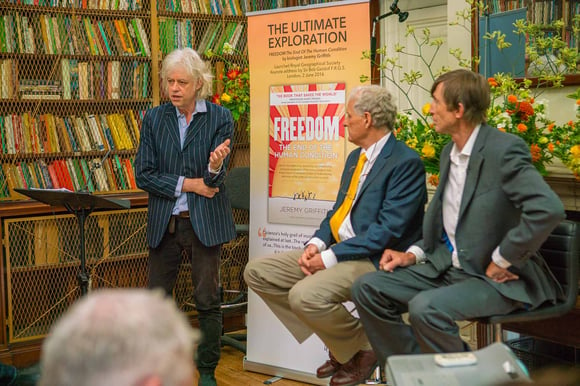
UK MEDIA RELEASE
To navigate & understand turbulent times, where do we look for new ideas and thinking? Bob Geldof advises
During his Royal Geographical Society keynote address at the launch of Australian biologist Jeremy Griffith’s book, Freedom: The End Of The Human Condition, Sir Bob Geldof urged people to read, talk about and understand Griffith’s work during this time of change, upheaval and crisis.
Geldof commented, “I’ve never felt the world more threatening, more fractious, more fissiparous, more febrile...we need to think, we need new ideas, we need proselytisers, we need obsessed people, which I think Jeremy is. We need him to be questioned. We need Freedom to be argued, we need it to be read and talked about and understood. It may be right, it may be wrong. But you need someone as committed as Jeremy to trying to understand what gets us here"
Jeremy Griffith is available for comment and interview.
About the book
Freedom: The End of the Human Condition
Jeremy Griffith
WTM Publishing & Communications
798 pages
£15.99
Paperback
Just published
About the author
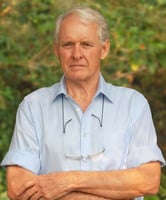 Jeremy Griffith was born in 1945 and raised on a sheep station (ranch) in rural New South Wales, Australia, Griffith was educated at Geelong Grammar School in Victoria and later graduated in biology from Sydney University. He spent six years in the wilds of Tasmania where he undertook the most thorough investigation ever into the plight of the Tasmanian Tiger, concluding that it was extinct. During this time, aged 27, Jeremy shifted his exploratory focus to humanity, which has remained his life’s preoccupation for the last 40 years. He started writing about the human condition in 1975, established the World Transformation Movement in 1983 (originally established as the Foundation for Humanity’s Adulthood), published his first book, Free: The End of the Human Condition in 1988, his second book, Beyond the Human Condition in 1991, and his bestselling third book, A Species In Denial, in 2004.
Jeremy Griffith was born in 1945 and raised on a sheep station (ranch) in rural New South Wales, Australia, Griffith was educated at Geelong Grammar School in Victoria and later graduated in biology from Sydney University. He spent six years in the wilds of Tasmania where he undertook the most thorough investigation ever into the plight of the Tasmanian Tiger, concluding that it was extinct. During this time, aged 27, Jeremy shifted his exploratory focus to humanity, which has remained his life’s preoccupation for the last 40 years. He started writing about the human condition in 1975, established the World Transformation Movement in 1983 (originally established as the Foundation for Humanity’s Adulthood), published his first book, Free: The End of the Human Condition in 1988, his second book, Beyond the Human Condition in 1991, and his bestselling third book, A Species In Denial, in 2004.
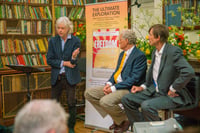
For images of the launch and access to other media materials, visit the book’s website
For interviews, comment, review copies or more information please contact:
WTM Publishing & Communications
HIGH RESOLUTION IMAGES OF THE LAUNCH (click to enlarge)
ABOUT FREEDOM AND ITS MARKETING
-
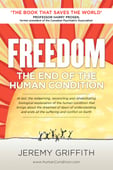
FREEDOM Front Cover
(High Res. image)
-
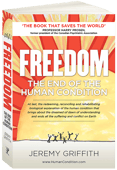
FREEDOM 3D Cover
(High Res. image)
-
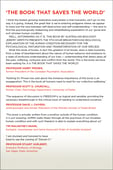
FREEDOM Back Cover
(High Res. image)
-

TRANSFORM YOUR LIFE
(High Res. image)
-
60 Sec
Video Trailer -
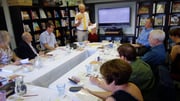
Author Presentation
To Book Sales Reps -

Other Creative
Launch Collateral
MAJOR ADVERTISING CAMPAIGN
Due to the critical need the world has for the explanation of the human condition contained in FREEDOM, an extremely substantial advertising campaign announced its May 2016 launch — including:
Very large advertisements in all the major newspapers in the English-speaking world — such as in The Wall Street Journal, The New York Times and USA Today in the US; The Globe and Mail in Canada; The Times, The Telegraph, The Economist and The Spectator in the UK; The Australian and major state newspapers in Australia; and The New Zealand Herald in New Zealand.
Online advertising, with an equally substantial budget to the print campaign, has commenced and will continue into 2017 and beyond.
Below are samples of the advertisements:
The Times (UK), full page colour (264mm x 338mm)
Download here
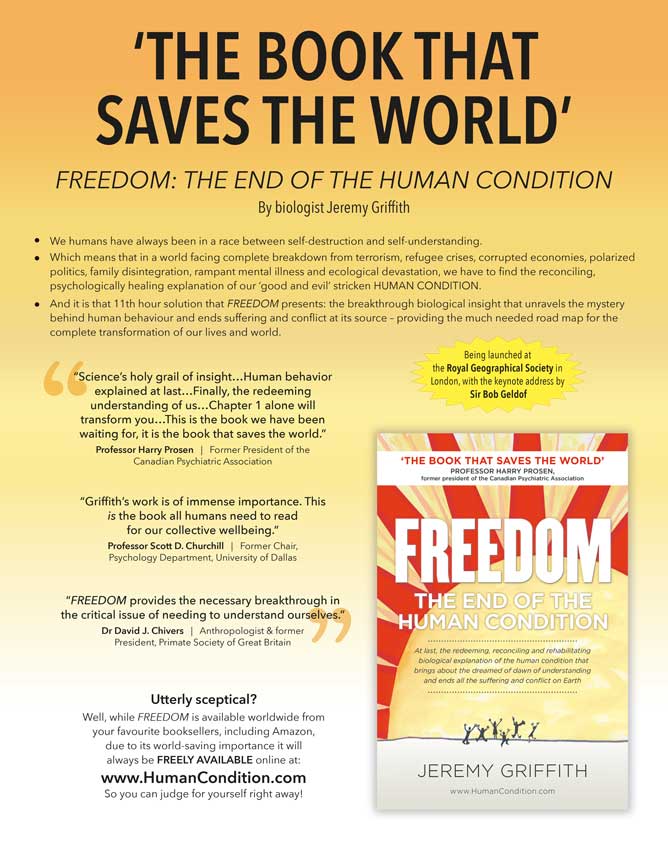
The New York Times, full page colour in Book Review section (244mm x 276mm) —
Download here
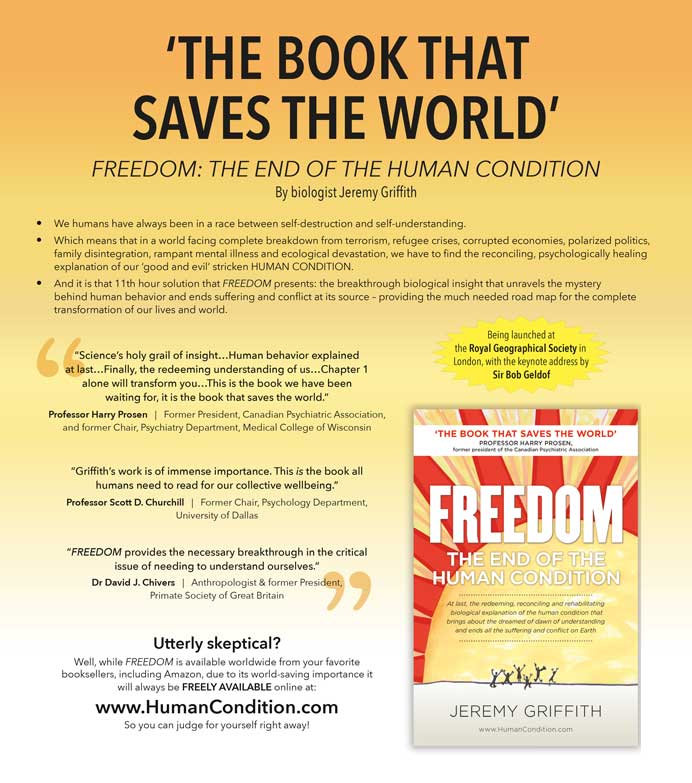
The Weekend Australian Magazine, full page colour (230 x 275mm)
Download here
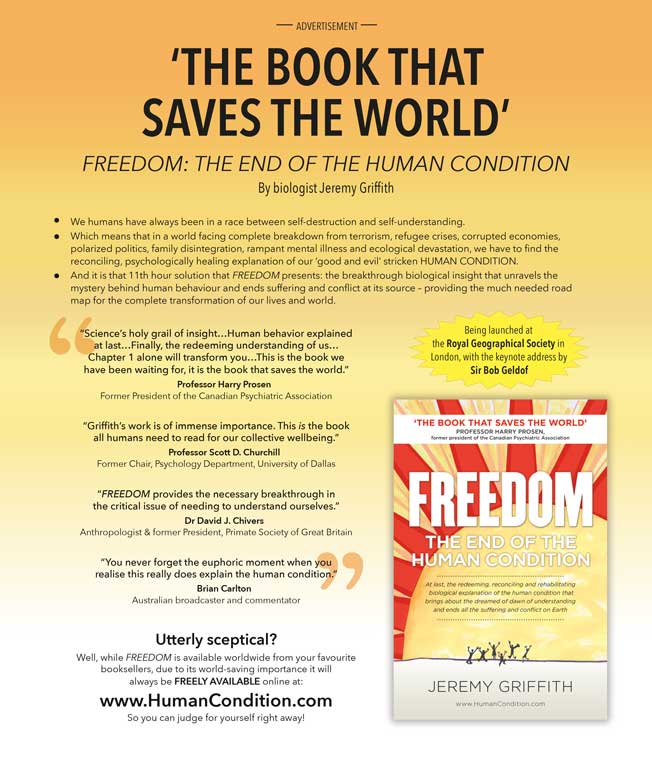
Online image Ad example
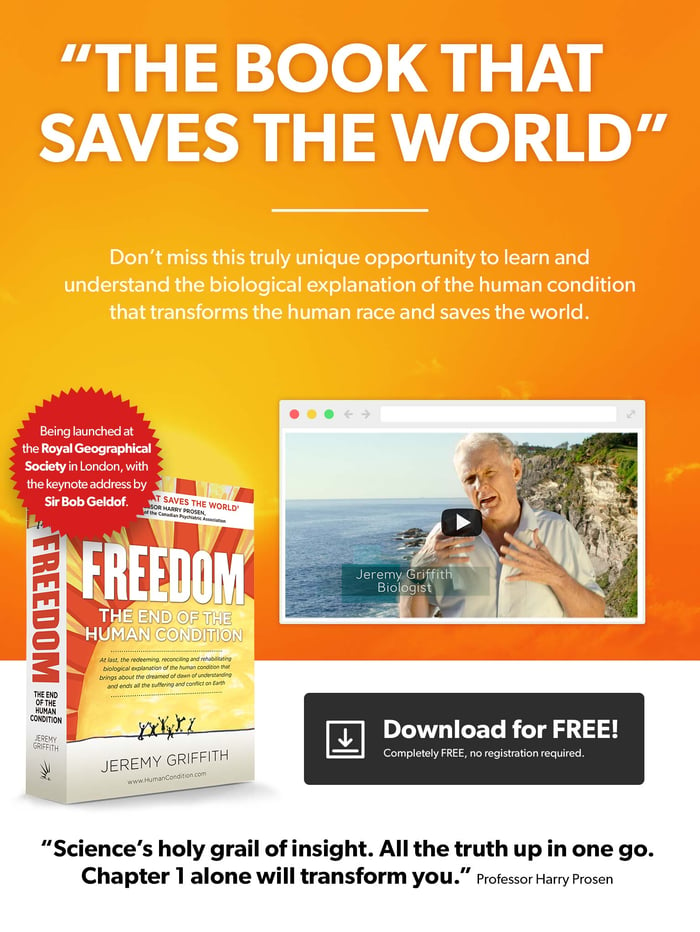
Online Text Ad examples
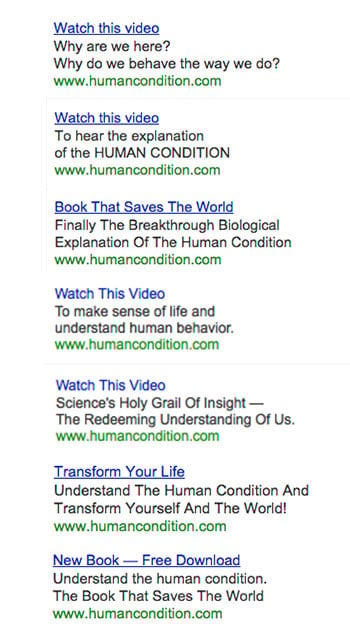
Online GIF Ad examples
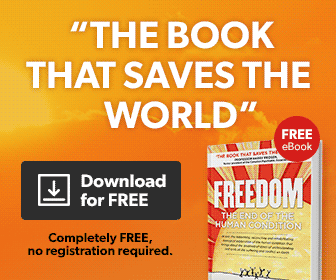
Other Creative Launch Collateral
Our UK and Australian publicists are using a series of postcards, drawing on the contents of FREEDOM, to send to media. We include 3 below (or Download the Australian version, UK version one or two). Other creative initiatives like this are being used to promote FREEDOM.
AUTHOR PRESENTATION TO BOOK SALES REPS
An informative and insightful presentation from the author to assist booksellers in their understanding and promotion of FREEDOM, covering its contents, choice of cover design and advertising.
‘FREEDOM’ SYNOPSIS WITH
CHAPTER SUMMARIES
FREEDOM: The End Of The Human Condition
by Jeremy Griffith
Synopsis
Why do we thinking, rational, immensely clever, supposedly sensible beings behave so ruthlessly, competitively and selfishly that human life has become all but unbearable and we have nearly destroyed our own planet? Are we a flawed species, some sort of evolutionary mistake, fundamentally worthless beings — or are we possibly the absolute heroes of the story of life on Earth? How are we to make sense of the awesome contradictions of the human condition? Yes, how are we to truly understand ourselves — because without redeeming, biological understanding there can be no real peace for the human mind, no basis for the much-needed psychological rehabilitation of the human race.
Venturing, however, into the heart of darkness of this most foreboding of all frontiers for the human mind of the issue of self, the issue of what the human condition really is, has been a near impossible task. When the poet Gerard Manley Hopkins wrote, ‘O the mind, mind has mountains; cliffs of fall, frightful, sheer, no-man-fathomed’, he was acknowledging how fearfully depressing the issue of the human condition has been for virtually all humans, and why, therefore, our condition has never been truthfully ‘fathomed’ — ‘truthfully’ because innumerable explanations have been put forward for the human condition, but none have genuinely confronted and, by so doing, solved the human condition.
But no longer is this the case, because Australian biologist Jeremy Griffith has been able to venture right to the bottom of the dark depths of what it is to be human and return with the fully accountable, true explanation of our seemingly imperfect lives. At long last we have the redeeming and thus transforming understanding of human behaviour! And with that explanation found all the other great outstanding scientific mysteries about our existence are now also able to be explained — of the meaning of our existence, of the origin of our unconditionally selfless moral instincts, and of why we humans became conscious when other animals haven’t. Yes, the full story of life on Earth can finally be told!
Summary of Contents
Chapter 1. An analysis of the true nature of the human condition and our species’ intrinsic fear of the subject, and a summary of the understanding that is able to end the underlying insecurity and resulting psychosis of everyone’s condition and, through doing so, transform every human into a new, human-condition-free person.
Chapter 2. Why and how biologist E.O. Wilson and the rest of mechanistic science have been leading humanity to terminal alienation. Unable to confront the psychological dilemma of the human condition — our species’ seemingly inexplicable capacity for both ‘good and evil’ — humanity and its vehicle for enquiry, mechanistic science, has been in denial of the issue, presenting increasingly dishonest excuses for our uniquely contradictory behaviour.
Chapter 3. The truthful, human-condition-confronting, fully accountable, psychosis addressing-and-solving, real biological explanation of the human condition. The human condition emerged 2 million years ago when our intellect evolved sufficiently to wrest control from our instincts — a conflict that caused an upsetting psychological condition that is the underlying issue in all human affairs.
Chapter 4. The teleological meaning of human existence. With humans’ upset state defended, we can finally recognise the true integrative meaning of life and the laws of physics that govern it.
Chapter 5. How humans acquired their altruistic moral soul. Evidence from primatology and anthropology illustrates how ‘love-indoctrination’, the process whereby nurturing leads to infants being ‘indoctrinated’ into behaving selflessly, led to the emergence of genuinely altruistic moral instincts in our ancestors.
Chapter 6. Mechanistic science’s dangerous denial of the nurturing origins of humans’ moral nature. Current nurturing-denying scientific explanations for our cooperative behaviour are exposed and dismantled; includes description of the resistance this explanation has met, and its ultimate triumph in the biggest defamation case in Australia’s history.
Chapter 7. The fully accountable biological explanation for how, why and when humans became conscious.
Chapter 8. The denial-free account of our species’ heroic journey from ignorance to enlightenment. Humanity’s 7+ million year journey from Sahelanthropus through to Homo — a progression driven by our developing psychology — is paralleled with the life of an individual through Infancy, Childhood, Adolescence to Adulthood.
Chapter 9. How this psychosis-addressing-and-explaining, real biological explanation of the human condition heals our species’ upset and transforms the human race.
WRITTEN QUESTIONS & ANSWERS

FREEDOM: The End Of The Human Condition
by Jeremy Griffith
Questions & Answers
Who is Jeremy Griffith?
Born in 1945 and raised on a sheep station (ranch) in rural New South Wales, Australia, Griffith was educated at Geelong Grammar School in Victoria and later graduated in biology from Sydney University. He spent six years in the wilds of Tasmania where he undertook the most thorough investigation ever into the plight of the Tasmanian Tiger, concluding that it was extinct. During this time, aged 27, Jeremy shifted his exploratory focus to humanity, which has remained his life’s preoccupation for the last 40 years. He started writing about the human condition in 1975, established the World Transformation Movement in 1983 (originally established as the Foundation for Humanity’s Adulthood), published his first book, Free: The End of the Human Condition in 1988, his second book, Beyond the Human Condition in 1991, and his bestselling third book, A Species In Denial, in 2004.
What is the human condition?
The agony of being unable to truthfully answer the fundamental question of why we are the way we are — divisively instead of cooperatively behaved — has been the particular burden of human life. It has been our species’ particular affliction or condition — our ‘human condition’.
Why is it so important that we understand the human condition?
With every day bringing with it more alarming evidence of the turmoil of the human situation, it is unarguable that finding the psychologically relieving understanding of the reason for our destructive behaviour is the ONLY way we can halt the slide to total chaos and devastation. The journalist Richard Neville was frighteningly accurate when, in summarising the desperate state of our species’ situation, he wrote that ‘the world is hurtling to catastrophe: from nuclear horrors, a wrecked eco-system, 20 million dead each year from malnutrition, 600 million chronically hungry…All these crises are man made, their causes are psychological. The cures must come from this same source; which means the planet needs psychological maturity fast. We are locked in a race between self destruction and self discovery’. Our species has come to the critical juncture where ONLY ‘self discovery’ — reconciling, ameliorating, ‘psychological[ly]’ healing understanding of ourselves — can save us from ‘self destruction’.
What is Jeremy Griffith’s explanation of the human condition?
FREEDOM explains the difference between our instincts and intellect and the effect that difference has had on our behaviour. It describes how the anger and selfishness felt by humans is the result of these two factions within ourselves — the gene-based instinctive learning system struggling against the nerve-based intellect’s capacity to understand. This conflict, which started some two million years ago when consciousness emerged, causes humans to live with an undeserved sense of guilt that is characterised by competition and aggression. Once guilt is removed by being explained — which the explanation presented in FREEDOM now makes possible — the competition and aggression in humans will naturally subside.
How does science currently explain the human condition?
The human condition has been such a fearful, unconfrontable subject that science as a whole has become a purveyor of extremely dishonest, human-psychosis-avoiding theories — like Social Darwinism, Evolutionary Psychology, group selection — that seek to falsely account for, and thus dismiss, our paradoxical nature. We have argued that we are a victim of savage animal instincts that compel us to fight and compete for food, shelter, territory and a mate; that we are at the mercy of a biological need to reproduce our genes. There cannot be a more dangerous example of a dishonest theory than that which appears in biologist E.O. Wilson’s 2012 book, The Social Conquest of Earth — a theory that evasively trivializes the human condition as nothing more than selfless instincts at odds with selfish instincts within us.
Do Jeremy Griffith’s ideas have any scientific support?
While the mechanistic scientific establishment as a whole has studiously avoided the true, psychological nature of the human condition, Jeremy’s ideas have attracted the support of such eminent scientists as former President of the Canadian Psychiatric Association Professor Harry Prosen, Australia’s Templeton Prize-winning biologist Professor Charles Birch and New Zealand’s then foremost zoologist Professor John Morton, as well as other distinguished thinkers such as Sir Laurens van der Post.
Why aren’t these ideas mainstream?
Firstly, because Jeremy dares to look at the real psychological nature of the human condition, his work has been treated as heretical by mechanistic science, as an anathema to be dismissed and even persecuted. Also, because the book presents the profound analysis of the human condition, some people can find what is being said hard to take in (what is referred to in the first chapter as the ‘deaf-effect’), and others even find what is being discussed unbearably confronting, and become hostile to it.
Secondly, for someone to be able to explain, and, through that explanation, bring reconciling and ameliorating understanding to our deeply troubled, human-condition-afflicted lives, they obviously had to be thinking from a position outside the conventional whole-view-of-the-human-condition-avoiding, mechanistic framework. As Einstein said, ‘We can’t solve problems by using the same kind of thinking we used when we created them’!
Should people be sceptical of the claims made about FREEDOM?
The amazing thing is that while the absolutely astonishing claims made about FREEDOM, such as Professor Prosen asserting that it is ‘the book that saves the world’, warrant utter scepticism and accusations of deluded hubris and over-promise, the fact is they withstand scrutiny. A person can begin reading the book and the more they read into it the more they will realise the claims being made are actually true. So these outrageous claims provide the ideal way to attract interest — which is a strategy no other book could employ successfully because such claims couldn’t stand up to scrutiny; reading them wouldn’t lead to the realisation that they have provided the answers that the human race has been in search of, which is the realisation that reading this book actually produces, as Professors Prosen and Churchill say it does.
Why should people read this book?
As Professor Prosen has said, ‘the fastest growing realization everywhere is that humanity can’t go on the way it is going. Indeed, the great fear is we’re entering endgame where we appear to have lost the race between self-destruction and self-discovery.’ We need answers and we need them fast. While issues such as the environment have dominated concerns in recent times, the obvious truth is that we have only been focusing on the symptoms; everything to date has been nothing more than a band-aid. To stop the destruction of our world and the disintegration of society that is happening everywhere we look someone had to address and fix the cause of the problems, which is us humans — our psychosis. We are the problem — our out-of-control egocentric, selfish, competitive and ferociously vicious, mean and aggressive human condition. It is precisely this real problem of the human condition that FREEDOM finally delivers the psychologically redeeming, relieving and transforming understanding of.
What is the effect of understanding Jeremy Griffith’s explanation of the human condition?
Jeremy begins FREEDOM by explaining that, “This book liberates you, the reader, and all other humans from an underlying insecurity and resulting psychosis that all humans have suffered from since we became a fully conscious species some two million years ago.” The effect of finally knowing and understanding and living with this explanation is that it transforms humans from their psychologically insecure, human-condition-afflicted existence to a psychologically secure and mature, human-condition-free state. It ends all the bewilderment, confusion and uncertainty — all the insecurity — about human behaviour. In short, it unravels the whole mess we humans have been living in and unites the human race.
Who are some thinkers that Jeremy Griffith admires?
Jeremy’s work was founded on a long history of profound or ‘denial-free’ thinkers about the human condition dating back to Moses, Socrates, Plato and Christ, through to more contemporary profound, denial-free thinkers such as Charles Darwin, Teilhard de Chardin and Sir Laurens van der Post among others.
Is this some sort of religion?
No. Unlike religions, which are based on faith or dogma, the understanding of the human condition, and the transformed way of living it brings about, is based on rational, first-principle-based biology; it is knowledge-driven — knowledge that, after a few generations, has the ability to eliminate all the upset in humans. So while religions were an incredibly effective means of containing the upset in humans while the search for understanding of that upset condition was being carried out, the transformed way of living is, in complete contrast, concerned with what happens after that liberating understanding is found, which is the advancement of the human race from a human-condition-afflicted state to a state completely free of that terrible affliction.
Another immense difference between this new transformed way of living and a religion is that in the transformed way of living there is no deity involved, or deference to any one personality; in fact, there is no worship of any kind. And best of all, unlike religion, there is no involvement or emphasis on guilt, because guilt — and the whole notion of ‘good and evil’ — has been eliminated forever with the reconciling understanding of the human condition.
What is Professor Prosen’s background?
Harry Prosen MD is a North American psychiatrist. His former roles include Head of the Department of Psychiatry at the University of Manitoba, Chairman of the Department of Psychiatry and Behavioural Medicine at the Medical College of Wisconsin, and President of the Canadian Psychiatric Association. Since 1998, he has been psychiatric consultant to the Bonobo Species Preservation Society, assisting primatologists working with one of the largest collections of captive bonobo primates in the world at the Milwaukee County Zoo, studying bonobo culture and development. This work has led to Prosen receiving numerous consultations in the United States and other parts of the world concerning psychological and other problems in primates. Recently, the rehabilitation of an emotionally disturbed young bonobo named “Brian” generated substantial publicity, including a story in The Atlantic.
ADAPTED EXCERPT FROM ‘FREEDOM’ FOR MEDIA PUBLICATION

FREEDOM: The End Of The Human Condition
by Jeremy Griffith
Adapted Excerpt
Word count: 2535
‘We are locked in a race between self destruction and self discovery.’
— Journalist Richard Neville
The Dilemma of the Human Condition
Here on Earth some of the most complex arrangements of matter in the known universe have come into existence. Life, in all its incredible diversity and richness, developed. And, by virtue of our mind, the human species must surely represent the culmination of this grand experiment of nature we call life — for, as far as we can detect, we are the first organism to have developed the fully conscious ability to sufficiently understand and thus manage the relationship between cause and effect to wrest management of our lives from our instincts, and to even reflect upon our existence. It is easy to lose sight of the utter magnificence of what we are, but the human mind must surely be nature’s most astonishing creation. Indeed, it must be one of the wonders of the universe! Consider, for example, the intellectual brilliance involved in sending three of our kind to the Moon and back.
And yet, despite our species’ magnificent mental capabilities, and undeniable capacity for immense sensitivity and love, behind every wondrous scientific achievement, sensitive artistic expression and compassionate act lies the shadow of humanity’s darker side — an unspeakable history of greed, hatred, rape, torture, murder and war; a propensity for deeds of shocking violence, depravity, indifference and cruelty.
As the philosopher Arthur Schopenhauer wrote, “man is the only animal which causes pain to others with no other object than causing pain…No animal ever torments another for the sake of tormenting: but man does so, and it is this which constitutes the diabolical nature which is far worse than the merely bestial.” Yes, undermining all our marvellous accomplishments and sensibilities is the fact that we humans have also been the most ferocious and malicious and seemingly evil creatures to have ever lived on Earth. But are we really evil?
How we excused our dark side while we couldn’t truthfully explain it
Certainly we have used the excuse that our behaviour is no different to that seen in the animal kingdom — that we are competitive, aggressive and selfish because of our animal heritage. We have argued that we are, as Tennyson put it, “red in tooth and claw” — a victim of savage animal instincts that compel us to fight and compete for food, shelter, territory and a mate; that we are at the mercy of a biological need to reproduce our genes. But this reason that biologists have been perpetuating cannot be the real cause of our divisive behaviour because descriptions of human behaviour, such as egocentric, arrogant, inspired, depressed, deluded, optimistic, pessimistic, artificial, hateful, mean, immoral, guilt-ridden, evil, psychotic, neurotic, alienated, all recognise the involvement of our species’ unique fully conscious thinking mind — that there is a psychological dimension to our behaviour. Humans have suffered not from the genetic-opportunism-based, non-psychological animal condition, but the conscious-mind-based, psychologically troubled human condition.
The real biological explanation of the human condition that both acknowledges and explains our collective psychosis — and reveals the astronomical courage of the human race
Clearly, a fresh approach has been needed — an analysis of our human situation from a basis that recognises and confronts the psychological dimension to our behaviour. When that approach is taken the explanation of our less-than-ideal human condition is relatively straight forward. The explanation begins with an analysis of consciousness.
Nerves were originally developed for the coordination of movement in animals, but, once developed, their ability to store impressions — what we refer to as ‘memory’ — gave rise to the potential to develop understanding of cause and effect. If you can remember past events, you can compare them with current events and identify regularly occurring experiences. This knowledge of, or insight into, what has commonly occurred in the past enables you to predict what is likely to happen in the future and to adjust your behaviour accordingly. Once insights into the nature of change are put into effect, the self-modified behaviour starts to provide feedback, refining the insights further. Predictions are compared with outcomes and so on. Much developed, and such refinement occurred in the human brain, nerves can sufficiently associate information to reason how experiences are related, learn to understand and become conscious of, or aware of, or intelligent about, the relationship between events that occur through time. Thus consciousness means being sufficiently aware of how experiences are related to attempt to manage change from a basis of understanding.
The significance of this process is that once our nerve-based learning system became sufficiently developed for us to become conscious and able to effectively manage events, our conscious intellect was then in a position to wrest control from our gene-based learning system’s instincts, which, up until then, had been in charge of our lives. Basically, once our self-adjusting intellect emerged it was capable of taking over the management of our lives from the instinctive orientations we had acquired through the natural selection of genetic traits that adapted us to our environment.
However, inevitably, it was at this juncture, when our conscious intellect challenged our instincts for control, that a struggle developed between our instincts and intellect, the effect of which was the extremely competitive, selfish and aggressive state that we call the ‘human condition’.
To elaborate, when our conscious intellect emerged it was neither suitable nor sustainable for it to be orientated by instincts — it had to find understanding to operate effectively and fulfil its great potential to manage life. However, when our intellect began to exert itself and experiment in the management of life from a basis of understanding, in effect challenging the role of the already established instinctual self, a battle unavoidably broke out between the instinctive self and the newer conscious self.
Our intellect began to experiment in understanding as the only means of discovering the correct and incorrect understandings for managing existence, but the instincts — being in effect ‘unaware’ or ‘ignorant’ of the intellect’s need to carry out these experiments — ‘opposed’ any understanding-produced deviations from the established instinctive orientations: they ‘criticised’ and ‘tried to stop’ the conscious mind’s necessary search for knowledge.
To illustrate the situation, imagine what would happen if we put a fully conscious mind on the head of a migrating bird. The bird is following an instinctive flight path acquired over thousands of generations of natural selection, but it now has a conscious mind that needs to understand how to behave, and the only way it can acquire that understanding is by experimenting in understanding — for example, thinking, ‘I’ll fly down to that island and have a rest.’ But such a deviation from the migratory flight path would naturally result in the instincts resisting the deviation, leaving the conscious intellect in a serious dilemma: if it obeys its instincts it will not feel ‘criticised’ by its instincts but neither will it find knowledge.
Obviously, the intellect could not afford to give in to the instincts, and unable to understand and thus explain why its experiments in self-adjustment were necessary the conscious intellect had no way of refuting the implicit criticism from the instincts even though it knew it was unjust. Until our conscious mind (because it was in us humans that the fully conscious mind developed) found the redeeming understanding of why it had to challenge the instincts (namely the understanding found by science of the difference in the way genes and nerves process information, that one is an orientating learning system while the other is an insightful learning system), our intellect was left having to endure the resistance — in effect unjust condemnation — from our instincts, leaving it no choice but to somehow defy that opposition from our instincts.
If we think about it, the only forms of defiance available to our conscious intellect were to attack the instincts’ unjust criticism, try to deny or block from our mind the instincts’ unjust criticism, and attempt to prove our instincts’ unjust criticism wrong. In short, the psychologically upset angry, alienated and egocentric human-condition-afflicted state appeared. Our ‘conscious thinking self’, which is the dictionary definition of ‘ego’, became ‘centred’ or focused on the need to justify itself. We became ego-centric, self-centred or selfish, preoccupied with aggressively competing for opportunities to prove we are good and not bad — we unavoidably became selfish, aggressive and competitive.
So, without the redeeming understanding that science has given us of why we had to challenge our instincts (specifically that genes can orientate but only nerves can understand), humans had no choice but to resign ourselves to living a psychologically upset life of anger, egocentricity and alienation as the only three responses available to us to cope with the horror of our situation.
It was an extremely unfair and difficult, indeed tragic, position for humans to find themselves in, for we can see that while we were good we appeared to be bad and had to endure the horror of our psychologically distressed, upset condition until we found the real — as opposed to the invented or contrived not-psychosis-recognising — defence or reason for our ‘mistakes’. Basically, suffering psychological upset was the price of our heroic search for understanding.
The reality is that any animal that developed a fully conscious mind would encounter resistance from its instincts and presumably develop the equivalent of the upset state of the human condition — with the only cure being the ability to explain the good reason for its divisive condition, because only that could end the need to retaliate, block out criticism, and try to prove its worth. As the psychoanalyst Carl Jung was forever saying about our condition, “wholeness for humans depends on the ability to own their own shadow”.
We can now see how the origins of our human condition has parallels with the pre-scientific Biblical account in the Book of Genesis of Adam and Eve’s experiences in the Garden of Eden, except in that presentation when Adam and Eve took the “fruit” (3:3) “from the tree of the knowledge of good and evil” (2:9, 17) — went in search of understanding — they were “banished…from the Garden” (3:23) for being “disobedient” (the term widely used in descriptions of Gen. 3) and becoming ‘bad’ or ‘evil’ or ‘sinful’. In this presentation, however, Adam and Eve are revealed to be the heroes, not the villains they have so long been portrayed as. So while humans are immensely upset — that is, immensely angry, egocentric and alienated — we are good and not bad after all! And ‘upset’ is the right word for our condition because while we are not ‘evil’ or ‘bad’ we are definitely psychologically upset from having to participate in humanity’s heroic search for knowledge, ultimately self-knowledge. ‘Corrupted’ and ‘fallen’ have sometimes been used to describe our condition, but they have negative connotations that we can now appreciate are undeserved.
For our species, it really has been a case of “Give me liberty or give me death”, “Death before dishonour”, “Never back down”, as the sayings go. Our conscious thinking self was never going to give in to our instinctive self or soul. Even though we had developed into angry, egocentric and alienated people, we were never going to accept that we were fundamentally bad, evil, worthless, awful beings; we weren’t going to wear that criticism — for if we did, we wouldn’t be able to get out of bed each morning and face the world. If we truly believed we were fundamentally evil beings, we would shoot ourselves. There had to be a greater truth that explained our behaviour and until we found it we couldn’t rest. And so every day as we got out of bed we took on the world of ignorance that was condemning us. We defied the implication that we are bad. We shook our fist at the heavens. In essence, we said, ‘One day, one day, we are going to prove our worth, explain that we are not bad after all, and until that day arrives we are not going to “back down”, we are not going to take the ignorant, naive, stupid, unjustified criticism from our instincts. No, we are going to fight back with all our might.’ And that is what we have done; that is what every conscious human that has ever lived has done — and because we did, because we persevered against all that criticism, we have now finally broken through and found the full truth that explains that humans are wonderful beings after all. In fact, not just wonderful, but the heroes of the whole story of life on Earth! This is because our fully conscious mind must be — given its phenomenal ability to understand the world — nature’s greatest invention, so for us humans who were given this greatest of all inventions to develop, to be made to endure the torture of being unjustly condemned as bad or evil for doing just that, and to have had to endure that torture for so long, some 2 million years (the time we have likely been fully conscious), has to make us the absolute champions of the story of life on Earth. We were given the hardest, toughest of tasks, and against all the odds we completed it. We are so, so wonderful.
Best of all, this breakthrough in understanding of ourselves ends all the anguish and strife in human life
The absolutely wonderfully psychologically relieving and thus transforming effect of this psychosis-addressing-and-solving real explanation of the human condition is that after 2 million years of uncertainty it finally allows all humans to understand that there has been a very good reason for our angry, alienated and egocentric lives. Indeed, this fact of the utter magnificence of the human race brings such intense relief to our angst-ridden cells, limbs and torsos that it will seem as though we have thrown off a shroud of heavy weights. The great, heavy burden of guilt has finally been lifted from the shoulders of humans. Yes, doesn’t the core feeling exist in all humans that far from being meaningless, “banish[ment]”-deserving “evil” blights on this planet we are all immense heroes? Doesn’t this explanation at last make sense of the immensely courageous and defiant attitude of all humans? And won’t this explanation bring deep, bone-draining relief to the whole of each person’s being?
Indeed, the ability now to explain and understand that we are actually all good and not bad enables all the upset that resulted from being unable to truthfully explain the source of our divisive condition to subside and disappear. Yes, finding the redeeming understanding of our troubled, psychologically upset, human-condition-afflicted existence finally enables the human race to be healed and thus transformed — it makes us “whole” again, as Jung said it would. To quote Professor Harry Prosen, a former president of the Canadian Psychiatric Association, on this dreamed-of, greatest of all breakthroughs in science: “I have no doubt this biological explanation of the human condition is the holy grail of insight we have sought for the psychological rehabilitation of the human race.”
As the following picture powerfully intimates, we have needed, and now have, the key that liberates the human mind from the underlying deep, dark, psychological trauma of the human condition.
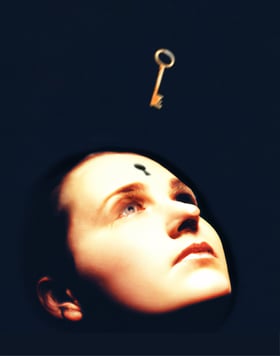
The full explanation of the human condition that is provided in this adapted excerpt is presented in Chapter 1 of FREEDOM: The End Of The Human Condition.
PROMOTIONAL PAMPHLET
A summary of FREEDOM ’s world-saving breakthrough explanation of the human condition, as well as commendations, author bio — all within the cover of a promotional poster.
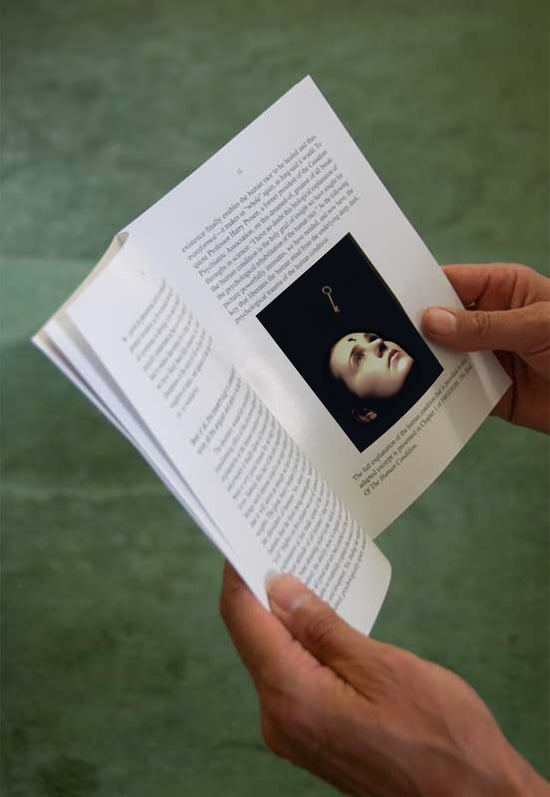
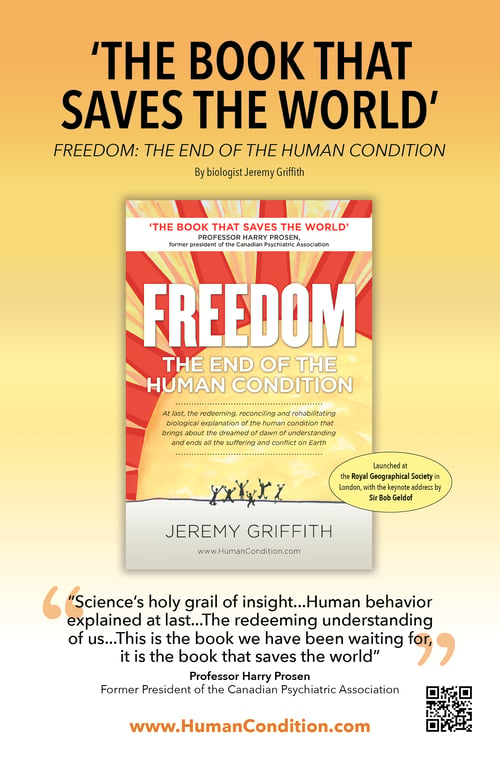
Adapted Excerpt from ‘FREEDOM: The End Of The Human Condition’ (Launch date: May 2016)
Science Reveals That Humans Are
The Heroes Of The Story Of Life On Earth
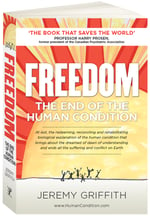
Summary
FREEDOM: The End Of The Human Condition by Australian biologist Jeremy Griffith presents the breakthrough biological explanation of the underlying issue in all human affairs of the human condition, our species’ capacity for so-called ‘good’ and ‘evil’. This is the now urgently needed insight that finally explains that humans are the heroes of the story of life on Earth, an insight that brings such bone-draining relief to every human’s embattled life that it will transform the human race.
The Dilemma of the Human Condition
Here on Earth some of the most complex arrangements of matter in the known universe have come into existence. Life, in all its incredible diversity and richness, developed. And, by virtue of our mind, the human species must surely represent the culmination of this grand experiment of nature we call life — for, as far as we can detect, we are the first organism to have developed the fully conscious ability to sufficiently understand and thus manage the relationship between cause and effect to wrest management of our lives from our instincts, and to even reflect upon our existence. It is easy to lose sight of the utter magnificence of what we are, but the human mind must surely be nature’s most astonishing creation. Indeed, it must be one of the wonders of the universe! Consider, for example, the intellectual brilliance involved in sending three of our kind to the Moon and back.
And yet, despite our species’ magnificent mental capabilities, and undeniable capacity for immense sensitivity and love, behind every wondrous scientific achievement, sensitive artistic expression and compassionate act lies the shadow of humanity’s darker side — an unspeakable history of greed, hatred, rape, torture, murder and war; a propensity for deeds of shocking violence, depravity, indifference and cruelty. As the philosopher Arthur Schopenhauer wrote, “man is the only animal which causes pain to others with no other object than causing pain…No animal ever torments another for the sake of tormenting: but man does so, and it is this which constitutes the diabolical nature which is far worse than the merely bestial.” Yes, undermining all our marvellous accomplishments and sensibilities is the fact that we humans have also been the most ferocious and malicious and seemingly evil creatures to have ever lived on Earth. But are we really evil?
How we excused our dark side while we couldn’t truthfully explain it
Certainly we have used the excuse that our behaviour is no different to that seen in the animal kingdom — that we are competitive, aggressive and selfish because of our animal heritage. We have argued that we are, as Tennyson put it, “red in tooth and claw” — a victim of savage animal instincts that compel us to fight and compete for food, shelter, territory and a mate; that we are at the mercy of a biological need to reproduce our genes. But this reason that biologists have been perpetuating cannot be the real cause of our divisive behaviour because descriptions of human behaviour, such as egocentric, arrogant, inspired, depressed, deluded, optimistic, pessimistic, artificial, hateful, mean, immoral, guilt-ridden, evil, psychotic, neurotic, alienated, all recognise the involvement of our species’ unique fully conscious thinking mind — that there is a psychological dimension to our behaviour. Humans have suffered not from the genetic-opportunism-based, non-psychological animal condition, but the conscious-mind-based, psychologically troubled human condition.
The real biological explanation of the human condition that both acknowledges and explains our collective psychosis — and reveals the astronomical courage of the human race
Clearly, a fresh approach has been needed — an analysis of our human situation from a basis that recognises and confronts the psychological dimension to our behaviour. When that approach is taken the explanation of our less-than-ideal human condition is relatively straight forward. The explanation begins with an analysis of consciousness.
Nerves were originally developed for the coordination of movement in animals, but, once developed, their ability to store impressions — what we refer to as ‘memory’ — gave rise to the potential to develop understanding of cause and effect. If you can remember past events, you can compare them with current events and identify regularly occurring experiences. This knowledge of, or insight into, what has commonly occurred in the past enables you to predict what is likely to happen in the future and to adjust your behaviour accordingly. Once insights into the nature of change are put into effect, the self-modified behaviour starts to provide feedback, refining the insights further. Predictions are compared with outcomes and so on. Much developed, and such refinement occurred in the human brain, nerves can sufficiently associate information to reason how experiences are related, learn to understand and become conscious of, or aware of, or intelligent about, the relationship between events that occur through time. Thus consciousness means being sufficiently aware of how experiences are related to attempt to manage change from a basis of understanding.
The significance of this process is that once our nerve-based learning system became sufficiently developed for us to become conscious and able to effectively manage events, our conscious intellect was then in a position to wrest control from our gene-based learning system’s instincts, which, up until then, had been in charge of our lives. Basically, once our self-adjusting intellect emerged it was capable of taking over the management of our lives from the instinctive orientations we had acquired through the natural selection of genetic traits that adapted us to our environment.
However, inevitably, it was at this juncture, when our conscious intellect challenged our instincts for control, that a struggle developed between our instincts and intellect, the effect of which was the extremely competitive, selfish and aggressive state that we call the ‘human condition’.
To elaborate, when our conscious intellect emerged it was neither suitable nor sustainable for it to be orientated by instincts — it had to find understanding to operate effectively and fulfil its great potential to manage life. However, when our intellect began to exert itself and experiment in the management of life from a basis of understanding, in effect challenging the role of the already established instinctual self, a battle unavoidably broke out between the instinctive self and the newer conscious self.
Our intellect began to experiment in understanding as the only means of discovering the correct and incorrect understandings for managing existence, but the instincts — being in effect ‘unaware’ or ‘ignorant’ of the intellect’s need to carry out these experiments — ‘opposed’ any understanding-produced deviations from the established instinctive orientations: they ‘criticised’ and ‘tried to stop’ the conscious mind’s necessary search for knowledge.
To illustrate the situation, imagine what would happen if we put a fully conscious mind on the head of a migrating bird. The bird is following an instinctive flight path acquired over thousands of generations of natural selection, but it now has a conscious mind that needs to understand how to behave, and the only way it can acquire that understanding is by experimenting in understanding — for example, thinking, ‘I’ll fly down to that island and have a rest.’ But such a deviation from the migratory flight path would naturally result in the instincts resisting the deviation, leaving the conscious intellect in a serious dilemma: if it obeys its instincts it will not feel ‘criticised’ by its instincts but neither will it find knowledge.
Obviously, the intellect could not afford to give in to the instincts, and unable to understand and thus explain why its experiments in self-adjustment were necessary the conscious intellect had no way of refuting the implicit criticism from the instincts even though it knew it was unjust. Until our conscious mind (because it was in us humans that the fully conscious mind developed) found the redeeming understanding of why it had to challenge the instincts (namely the understanding found by science of the difference in the way genes and nerves process information, that one is an orientating learning system while the other is an insightful learning system), our intellect was left having to endure the resistance — in effect unjust condemnation — from our instincts, leaving it no choice but to somehow defy that opposition from our instincts.
If we think about it, the only forms of defiance available to our conscious intellect were to attack the instincts’ unjust criticism, try to deny or block from our mind the instincts’ unjust criticism, and attempt to prove our instincts’ unjust criticism wrong. In short, the psychologically upset angry, alienated and egocentric human-condition-afflicted state appeared. Our ‘conscious thinking self’, which is the dictionary definition of ‘ego’, became ‘centred’ or focused on the need to justify itself. We became ego-centric, self-centred or selfish, preoccupied with aggressively competing for opportunities to prove we are good and not bad — we unavoidably became selfish, aggressive and competitive.
So, without the redeeming understanding that science has given us of why we had to challenge our instincts (specifically that genes can orientate but only nerves can understand), humans had no choice but to resign ourselves to living a psychologically upset life of anger, egocentricity and alienation as the only three responses available to us to cope with the horror of our situation.
It was an extremely unfair and difficult, indeed tragic, position for humans to find themselves in, for we can see that while we were good we appeared to be bad and had to endure the horror of our psychologically distressed, upset condition until we found the real — as opposed to the invented or contrived not-psychosis-recognising — defence or reason for our ‘mistakes’. Basically, suffering psychological upset was the price of our heroic search for understanding.
The reality is that any animal that developed a fully conscious mind would encounter resistance from its instincts and presumably develop the equivalent of the upset state of the human condition — with the only cure being the ability to explain the good reason for its divisive condition, because only that could end the need to retaliate, block out criticism, and try to prove its worth. As the psychoanalyst Carl Jung was forever saying about our condition, “wholeness for humans depends on the ability to own their own shadow”.
We can now see how the origins of our human condition has parallels with the pre-scientific Biblical account in the Book of Genesis of Adam and Eve’s experiences in the Garden of Eden, except in that presentation when Adam and Eve took the “fruit” (3:3) “from the tree of the knowledge of good and evil” (2:9, 17) — went in search of understanding — they were “banished…from the Garden” (3:23) for being “disobedient” (the term widely used in descriptions of Gen. 3) and becoming ‘bad’ or ‘evil’ or ‘sinful’. In this presentation, however, Adam and Eve are revealed to be the heroes, not the villains they have so long been portrayed as. So while humans are immensely upset — that is, immensely angry, egocentric and alienated — we are good and not bad after all! And ‘upset’s the right word for our condition because while we are not ‘evil’ or ‘bad’ we are definitely psychologically upset from having to participate in humanity’s heroic search for knowledge, ultimately self-knowledge. ‘Corrupted’ and ‘fallen’ have sometimes been used to describe our condition, but they have negative connotations that we can now appreciate are undeserved.
For our species, it really has been a case of “Give me liberty or give me death”, “Death before dishonour”, “Never back down”, as the sayings go. Our conscious thinking self was never going to give in to our instinctive self or soul. Even though we had developed into angry, egocentric and alienated people, we were never going to accept that we were fundamentally bad, evil, worthless, awful beings; we weren’t going to wear that criticism — for if we did, we wouldn’t be able to get out of bed each morning and face the world. If we truly believed we were fundamentally evil beings, we would shoot ourselves. There had to be a greater truth that explained our behaviour and until we found it we couldn’t rest. And so every day as we got out of bed we took on the world of ignorance that was condemning us. We defied the implication that we are bad. We shook our fist at the heavens. In essence, we said, ‘One day, one day, we are going to prove our worth, explain that we are not bad after all, and until that day arrives we are not going to “back down”, we are not going to take the ignorant, naive, stupid, unjustified criticism from our instincts. No, we are going to fight back with all our might.’ And that is what we have done; that is what every conscious human that has ever lived has done — and because we did, because we persevered against all that criticism, we have now finally broken through and found the full truth that explains that humans are wonderful beings after all. In fact, not just wonderful, but the heroes of the whole story of life on Earth! This is because our fully conscious mind must be — given its phenomenal ability to understand the world — nature’s greatest invention, so for us humans who were given this greatest of all inventions to develop, to be made to endure the torture of being unjustly condemned as bad or evil for doing just that, and to have had to endure that torture for so long, some 2 million years (the time we have likely been fully conscious), has to make us the absolute champions of the story of life on Earth. We were given the hardest, toughest of tasks, and against all the odds we completed it. We are so, so wonderful.
Best of all, this breakthrough in understanding of ourselves ends all the anguish and strife in human life
The absolutely wonderfully psychologically relieving and thus transforming effect of this psychosis-addressing-and-solving real explanation of the human condition is that after 2 million years of uncertainty it finally allows all humans to understand that there has been a very good reason for our angry, alienated and egocentric lives. Indeed, this fact of the utter magnificence of the human race brings such intense relief to our angst-ridden cells, limbs and torsos that it will seem as though we have thrown off a shroud of heavy weights. The great, heavy burden of guilt has finally been lifted from the shoulders of humans. Yes, doesn’t the core feeling exist in all humans that far from being meaningless, “banish[ment]”-deserving “evil” blights on this planet we are all immense heroes? Doesn’t this explanation at last make sense of the immensely courageous and defiant attitude of all humans? And won’t this explanation bring deep, bone-draining relief to the whole of each person’s being?
Indeed, the ability now to explain and understand that we are actually all good and not bad enables all the upset that resulted from being unable to truthfully explain the source of our divisive condition to subside and disappear. Yes, finding the redeeming understanding of our troubled, psychologically upset, human-condition-afflicted existence finally enables the human race to be healed and thus transformed — it makes us “whole” again, as Jung said it would. To quote Professor Harry Prosen, a former president of the Canadian Psychiatric Association, on this dreamed-of, greatest of all breakthroughs in science: “I have no doubt this biological explanation of the human condition is the holy grail of insight we have sought for the psychological rehabilitation of the human race.”
As the following picture powerfully intimates, we have needed, and now have, the key that liberates the human mind from the underlying deep, dark, psychological trauma of the human condition.

The full explanation of the human condition that is provided in this adapted excerpt is presented in Chapter 1 of FREEDOM: The End Of The Human Condition.
About the Author
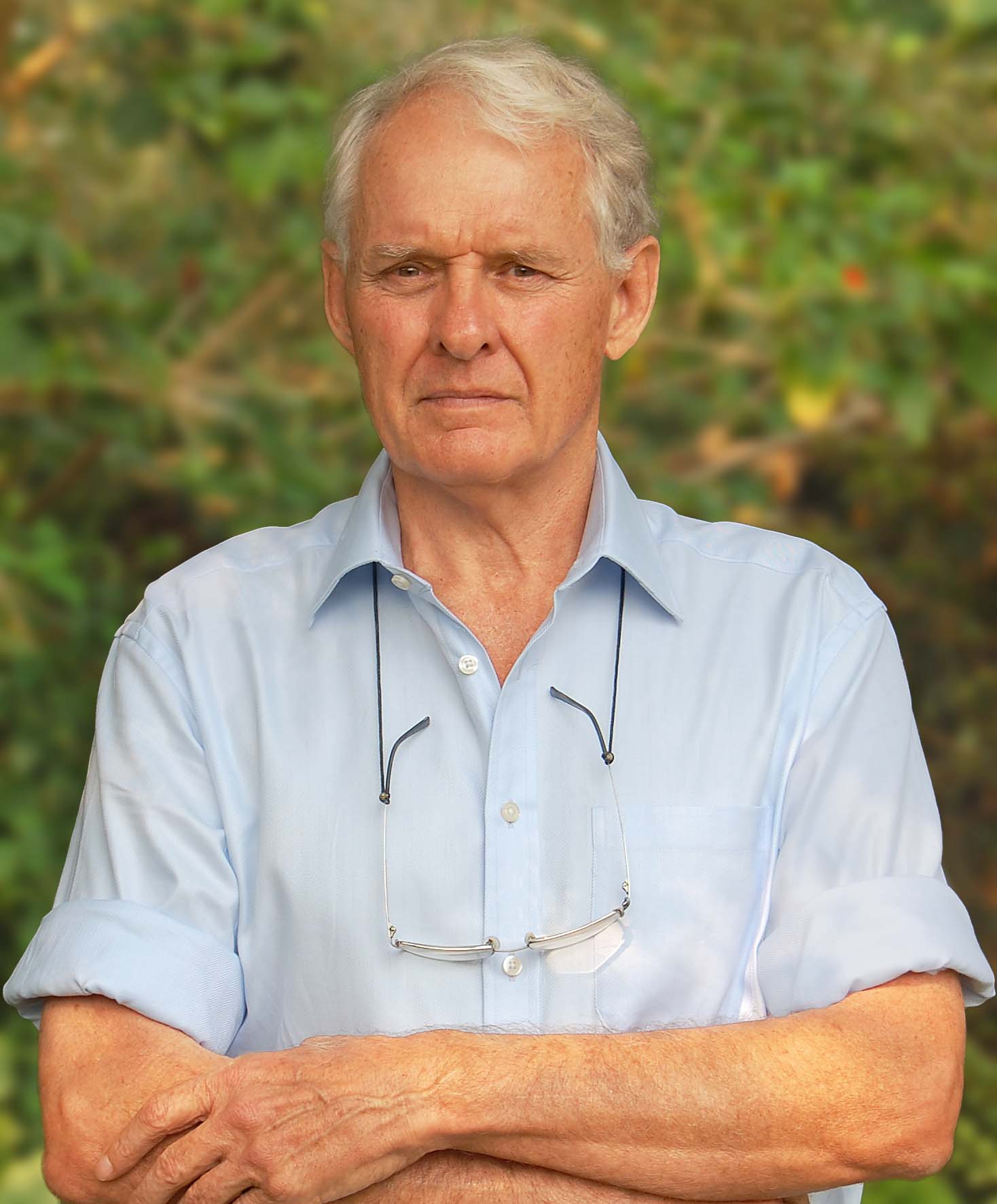
Born in 1945, and raised on a sheep station (ranch) in rural New South Wales, Australia, Jeremy Griffith was educated at Geelong Grammar School in Victoria. He matriculated with first class honours in biology and in 1965 began a science degree at the University of New England in northern New South Wales. While there, Jeremy played representative rugby union football, making the 1966 trials for the national team, the Wallabies.
Deferring his studies in 1967, Jeremy hitchhiked to Tasmania, determined to save the Thylacine — the Tasmanian Tiger — from extinction. The search was to last more than six years — the most thorough investigation ever into the plight of the Tasmanian Tiger — but sadly concluded the ‘Tiger’ was indeed extinct.
The quest generated articles in the American Museum of Natural History’s journal, Natural History, and Australian Geographic, and featured in an episode of the Australian television series A Big Country.
In 1971 Jeremy completed his BSc in zoology at the University of Sydney and the following year, in the same self-sufficient spirit with which he had undertaken the ‘Tiger’ search, he established Griffith Tablecraft, a highly successful business manufacturing furniture based on his own simple and natural designs. It was during this time that, at age 27, Jeremy realised that trying to save animals from extinction or trying to build ideal furniture wasn’t addressing the real issue behind the extraordinary imperfection in human life, which is our behaviour, and that what was really needed in the world was a deeper understanding of ourselves — so it was to this issue of our species’ less-than-ideal behaviour that Jeremy turned his attention, a study that has remained his life’s focus for the last 45 years. Jeremy started writing about the human condition in 1975, established the non-profit organisation the World Transformation Movement in 1983 (dedicated to the study and amelioration of the human condition), and is the author of over 10 books on the subject, including the 2004 bestseller, A Species In Denial and in 2016, FREEDOM: The End Of The Human Condition, his “summa masterpiece”. In 2020 a much acclaimed and replayed around the world one-hour interview with Jeremy about his explanation of the human condition was broadcast in the UK. The transcript of this now famous interview is provided in the booklet THE Interview. Jeremy lives in New South Wales, Australia.
Praise
‘This biological explanation of the human condition is the holy grail of insight we have sought for the psychological rehabilitation of the human race. This is the book we have been waiting for, it is the book that saves the world.’
From the book’s Introduction by PROFESSOR HARRY PROSEN,
former President of the Canadian Psychiatric Association, and former Chair, Psychiatry Department, Medical College of Wisconsin
‘Nothing Dr. Prosen has said about the immense importance of this book is an exaggeration. This is the book all humans need to read for our collective wellbeing.’
PROFESSOR SCOTT D. CHURCHILL,
Professor and former Chair, Psychology Department, University of Dallas
‘The sequence of discussion in ‘FREEDOM’ is so logical and sensible, providing the necessary breakthrough in the critical issue of needing to understand ourselves.’
PROFESSOR DAVID CHIVERS,
University of Cambridge anthropologist and former President of the Primate Society of Great Britain
‘This book is actually written from a position outside of the human condition. It is just amazing; Griffith walks freely through all the psychosis of our troubled human condition and with such freedom is able to explain everything about us!’
TIM MACARTNEY-SNAPE,
biologist, mountaineer and twice-honored Order of Australia recipient
‘I am stunned and honored to have lived to see the coming of “Darwin II”.’
PROFESSOR STUART HURLBERT,
Emeritus Professor of Biology, San Diego State University
Book Details:
FREEDOM: The End Of The Human Condition
Jeremy Griffith
Paperback
799 pages
WTM Publishing & Communications Pty Ltd
ISBN-13: 978-1-74129-024-0 (English Spelling)
ISBN-13: 978-1-74129-028-8 (US Spelling)
www.HumanCondition.com
Open a PDF to print or save: A4 or US Letter
(Print ‘two-sided’, ‘short-edge’ to create booklet)
Further Reading
- World Transformation Movement
- Jeremy Griffith Interview
- Jeremy Griffith reviews
- Jeremy Griffith Videos
- Jeremy Griffith books
- Jeremy Griffith biography
- World Transformation Movement About
- World Transformation Movement Jeremy Griffith
- World Transformation Movement Books
- World Transformation Movement Website
- World Transformation Movement interview
- World Transformation Movement Centres

